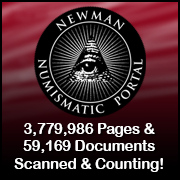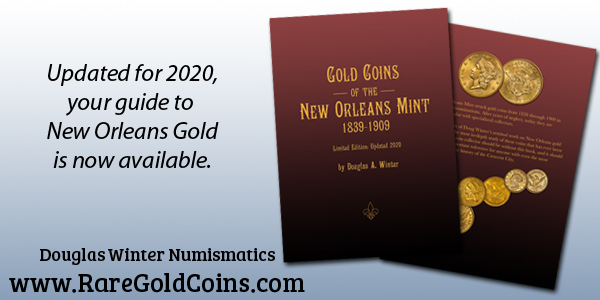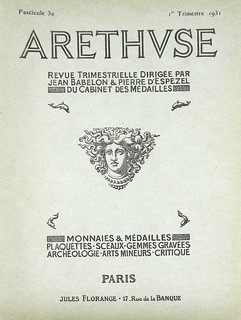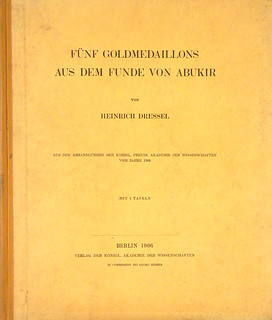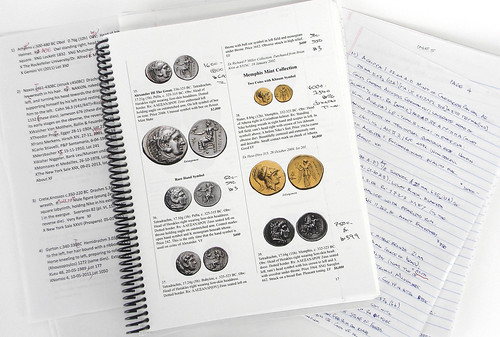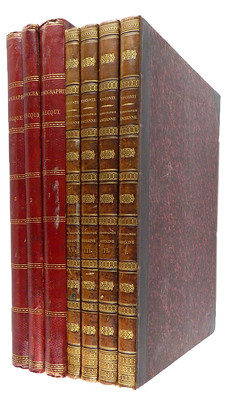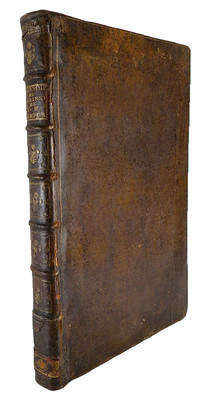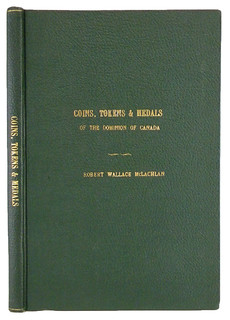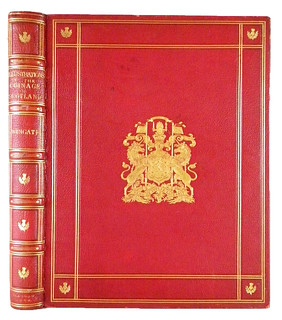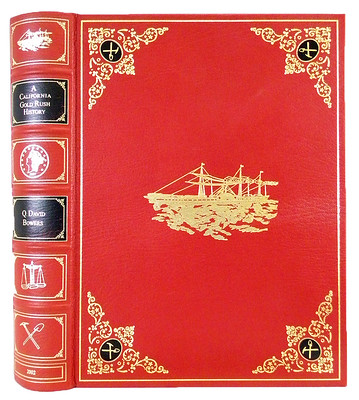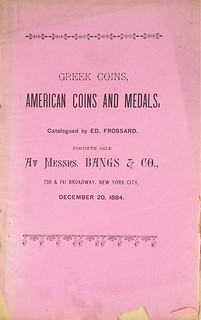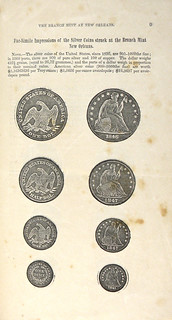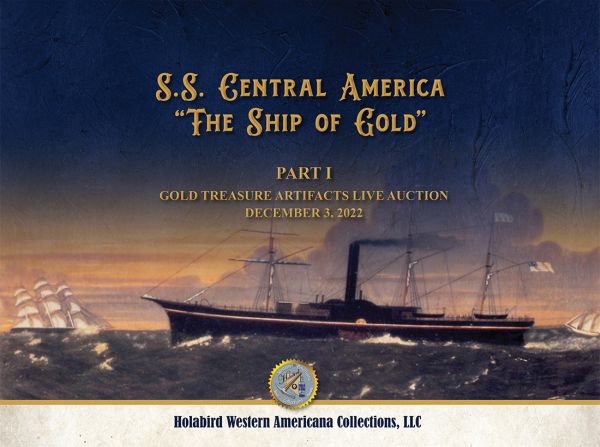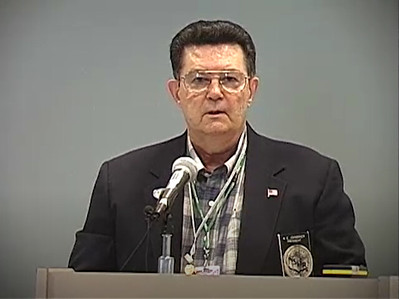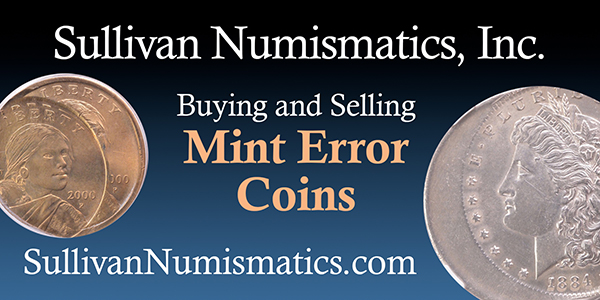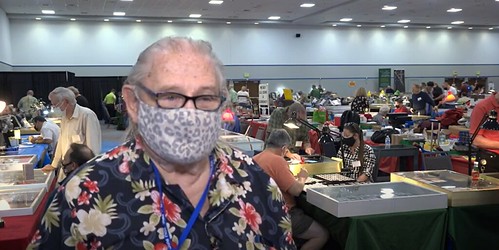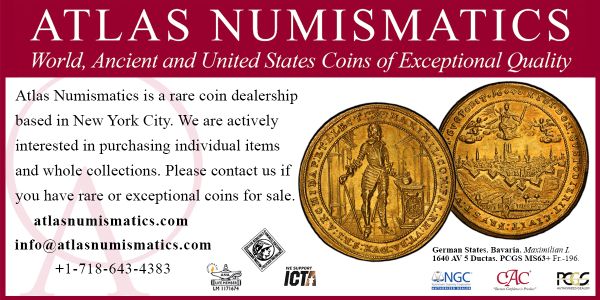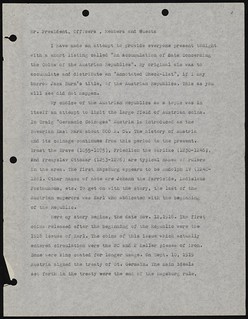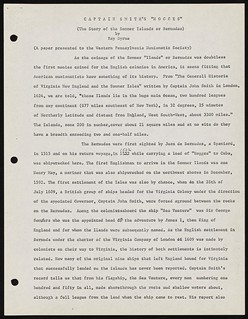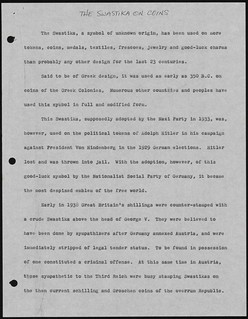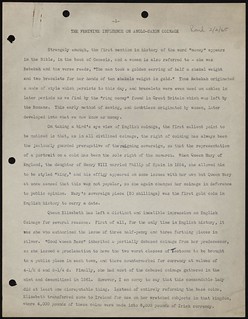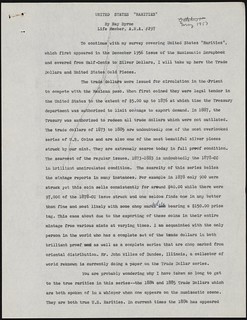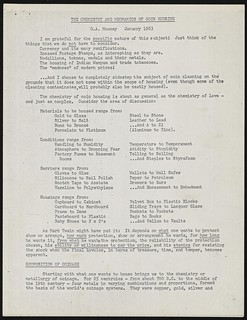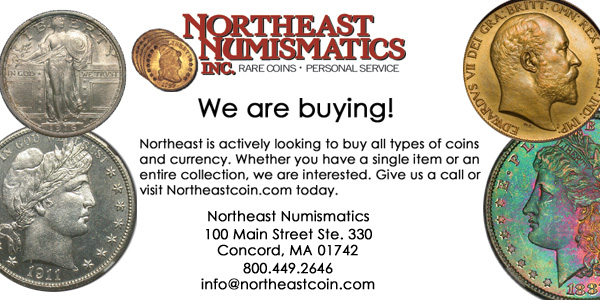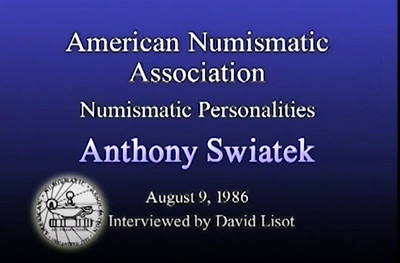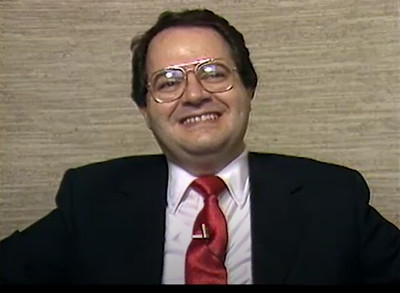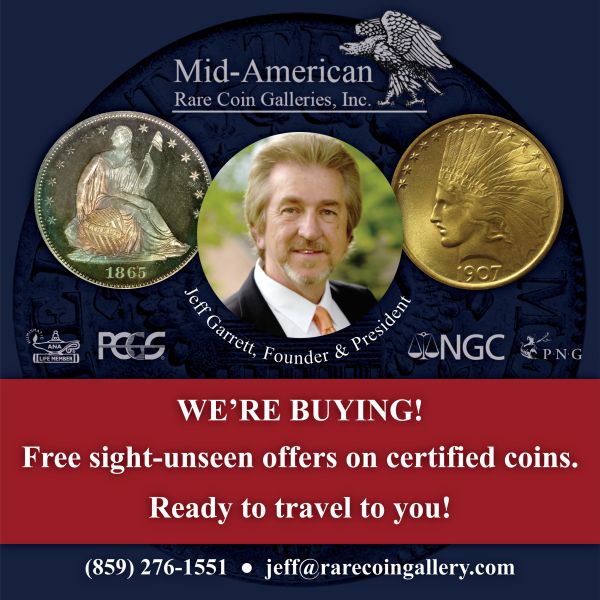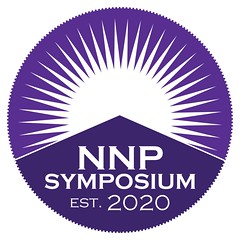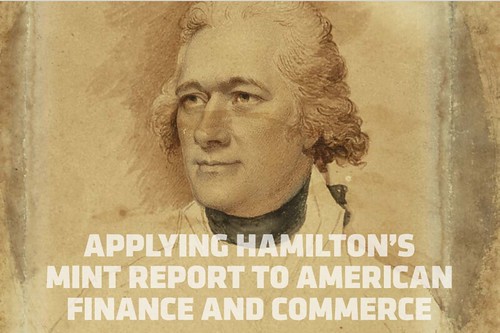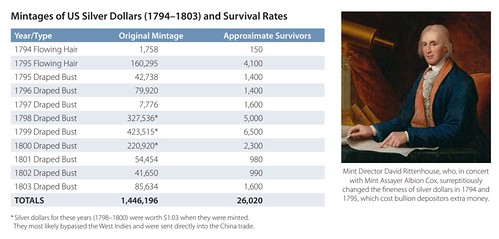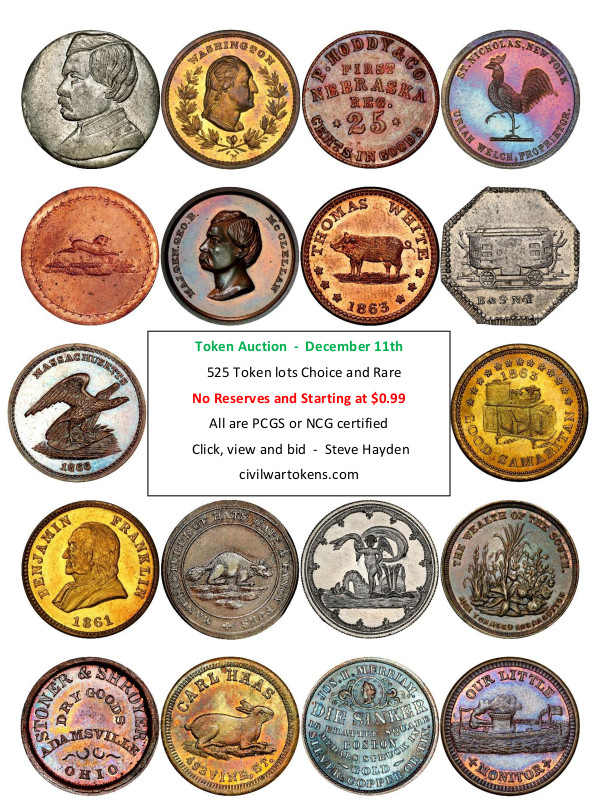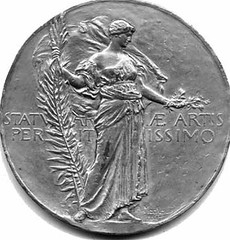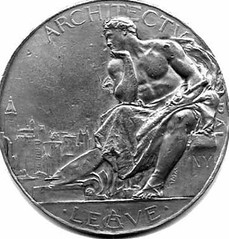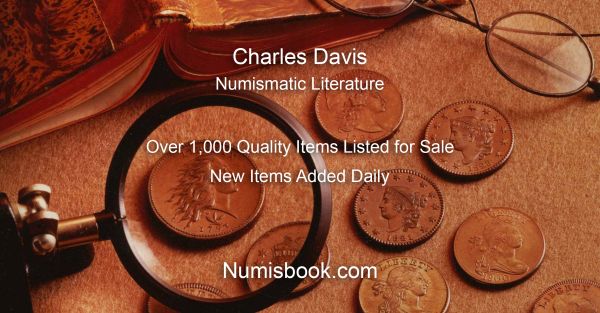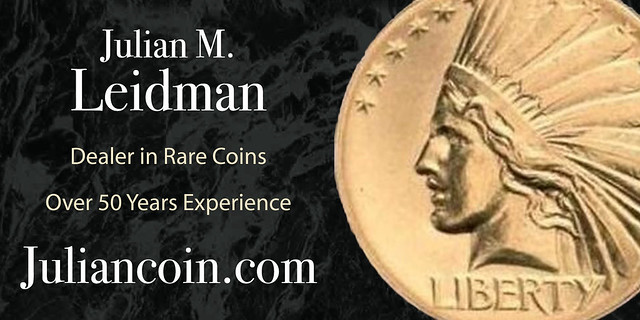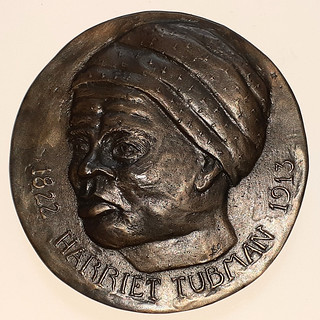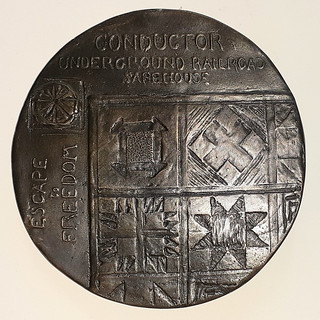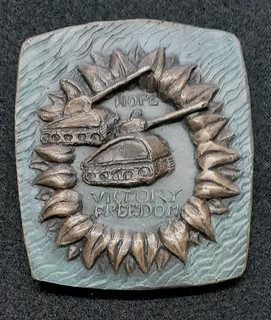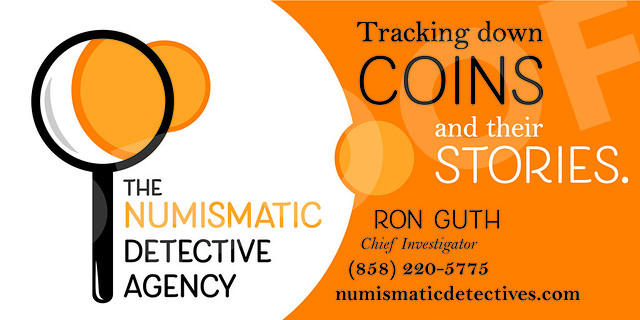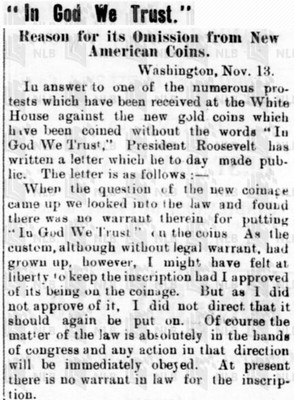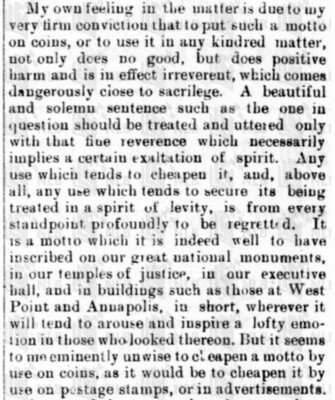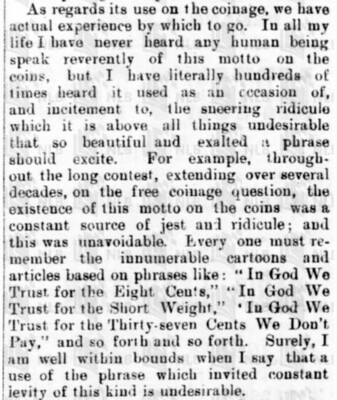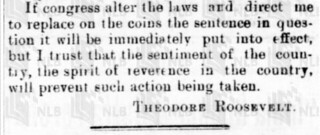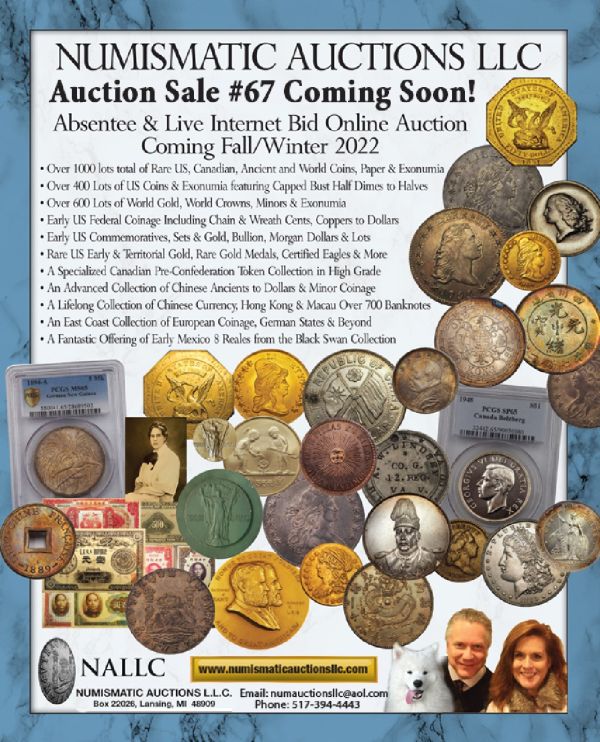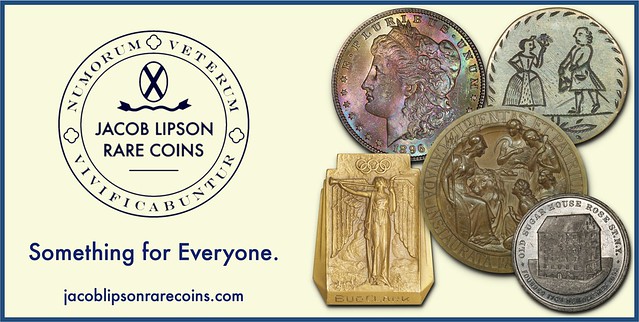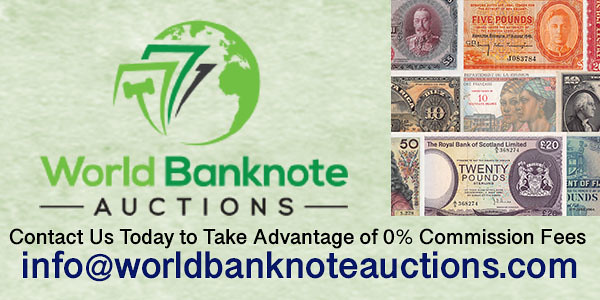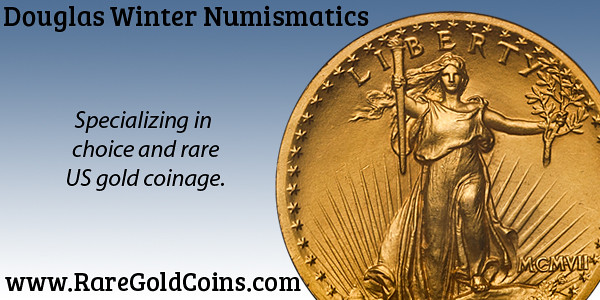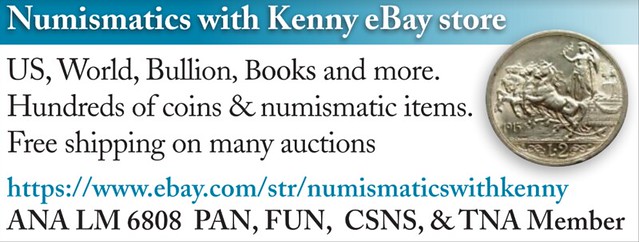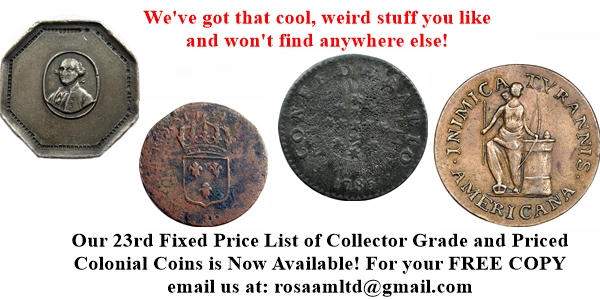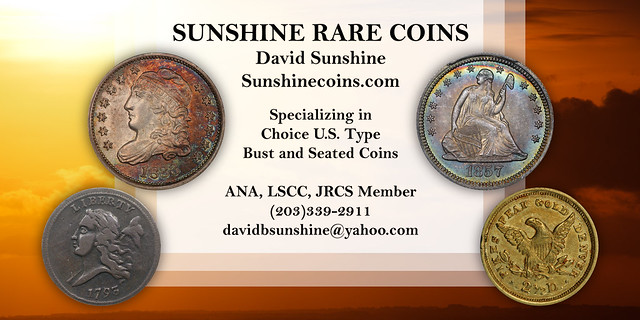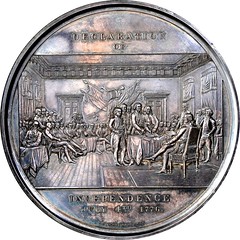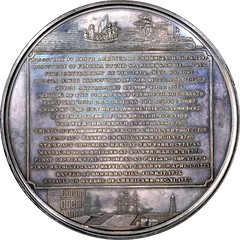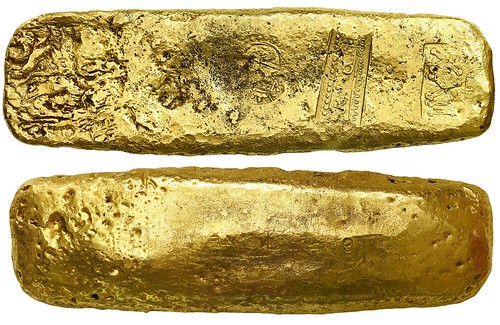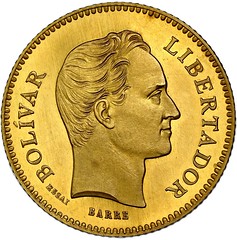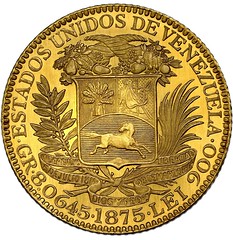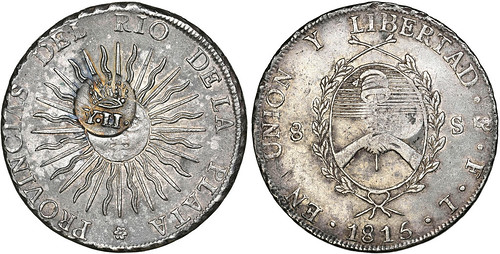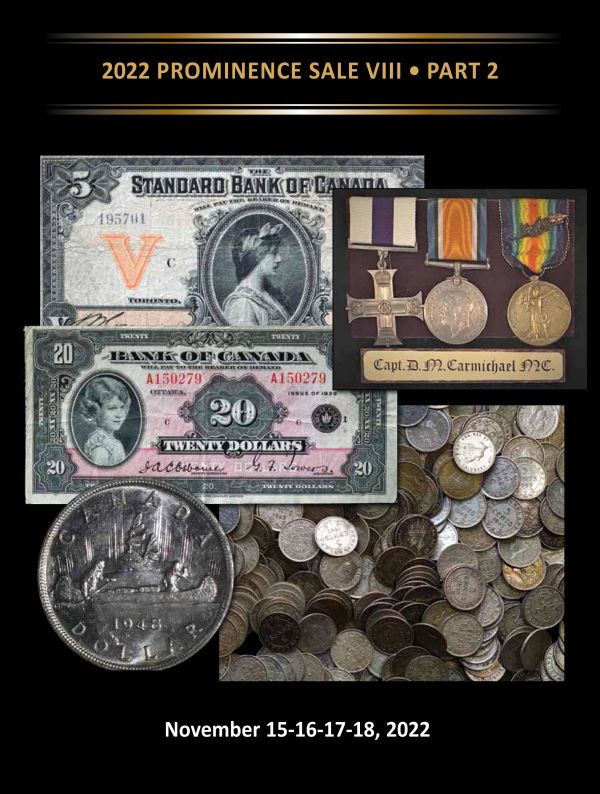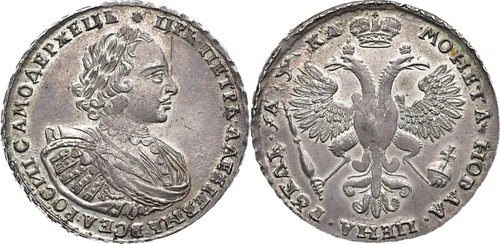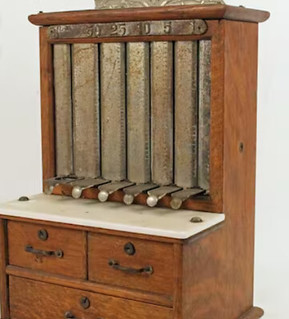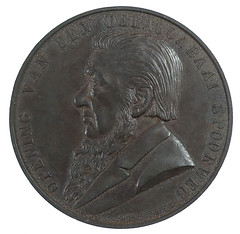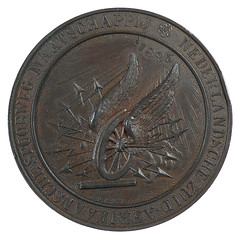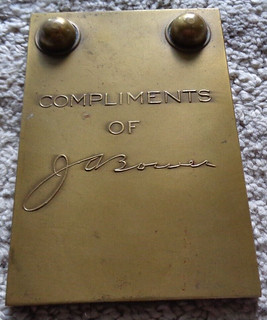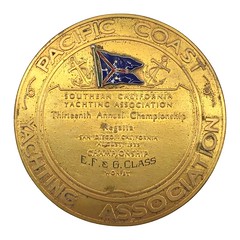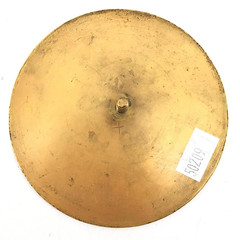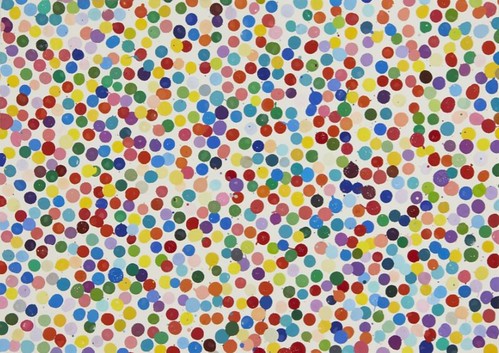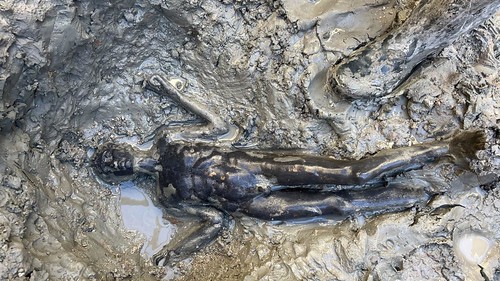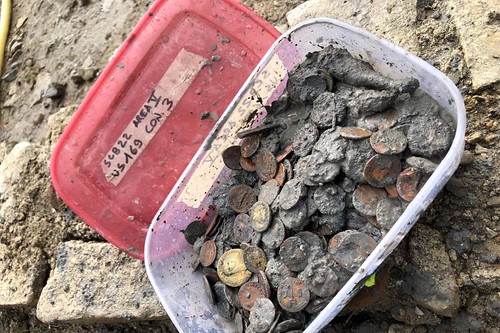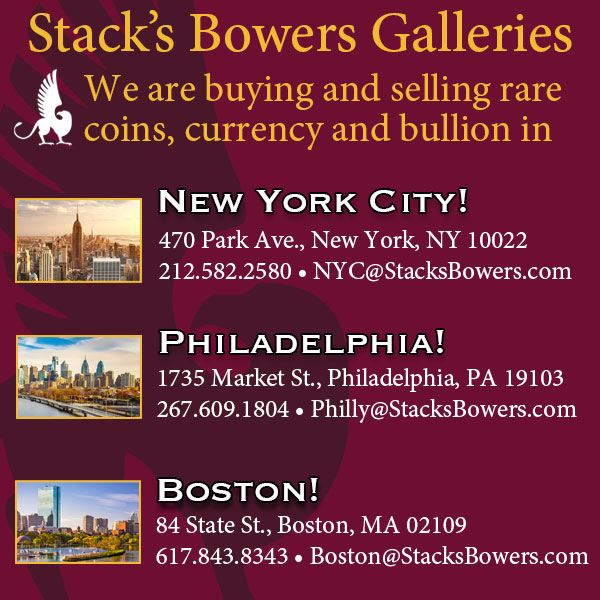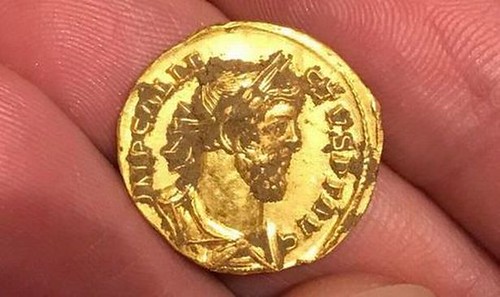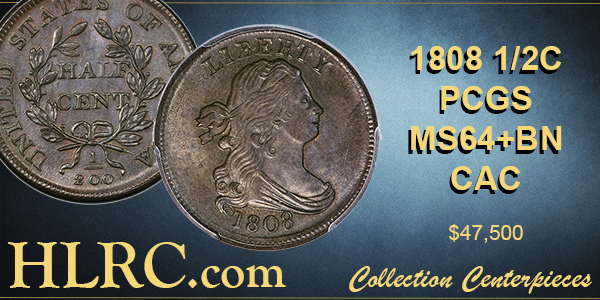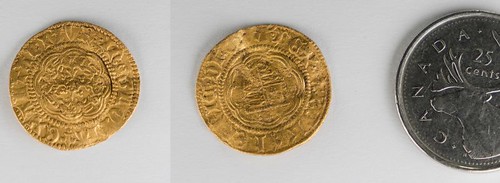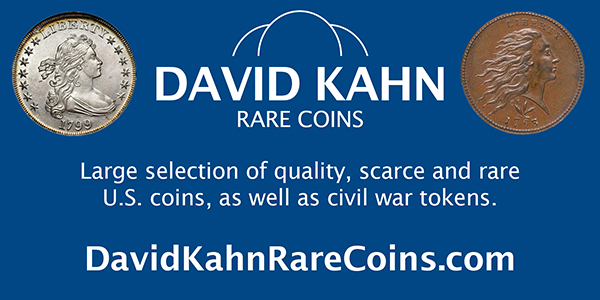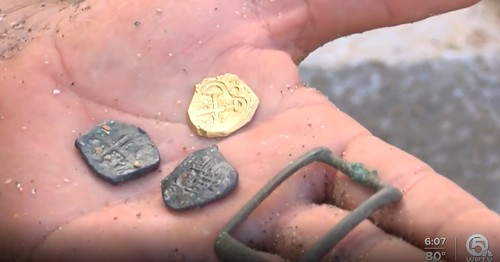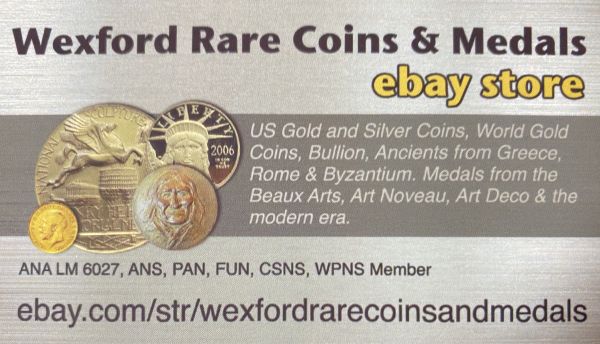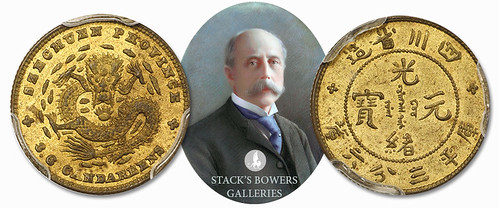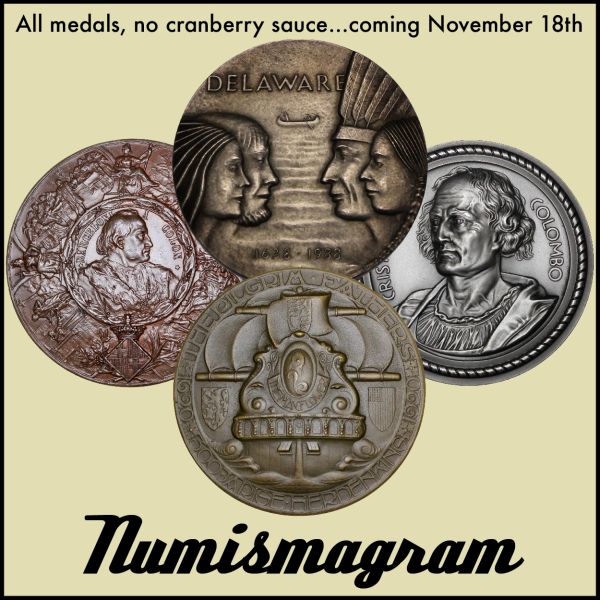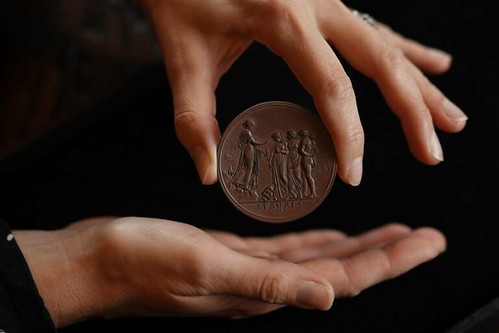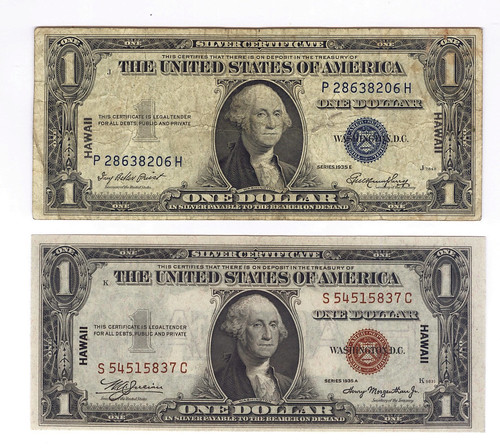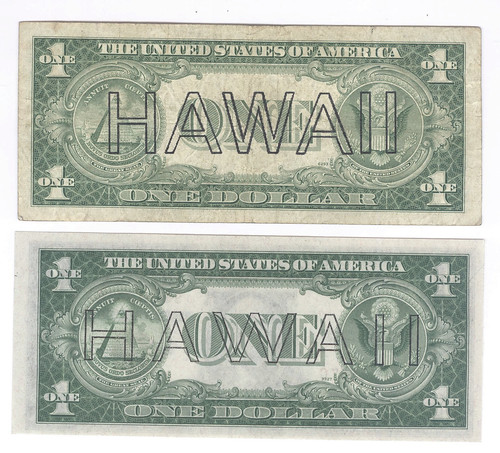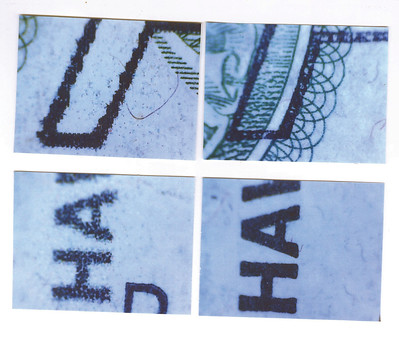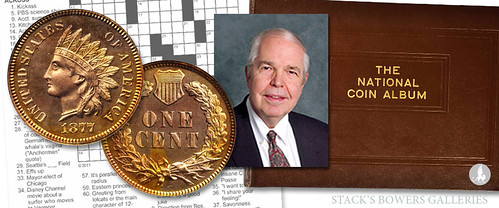
Visit our NBS Sponsors



About UsThe Numismatic Bibliomania Society is a non-profit association devoted to the study and enjoyment of numismatic literature. For more information please see our web site at coinbooks.org SubscriptionsThose wishing to become new E-Sylum subscribers (or wishing to Unsubscribe) can go to the following web page link MembershipThere is a membership application available on the web site Membership Application To join, print the application and return it with your check to the address printed on the application. Print/Digital membership is $40 to addresses in the U.S., and $60 elsewhere. A digital-only membership is available for $25. For those without web access, write to: Charles Heck, Treasurer AsylumFor Asylum mailing address changes and other membership questions, contact Chuck at this email address: treasurer@coinbooks.org SubmissionsTo submit items for publication in The E-Sylum, write to the Editor at this address: whomren@gmail.com BUY THE BOOK BEFORE THE COINSale CalendarWatch here for updates! |
- WAYNE'S WORDS: THE E-SYLUM NOVEMBER 13, 2022
- KOLBE & FANNING AUCTION SALE 165 ANNOUNCED
- ALFRED EDWARD JOHNBRIER (1935-2022)
- EDWARD KUSZMAR (1941-2022)
- WPNS PAPERS ON THE NEWMAN PORTAL
- VIDEO: ANTHONY SWIATEK INTERVIEW
- CSNS PARTNERS WITH NEWMAN NUMISMATIC PORTAL
- APPLYING HAMILTON'S 1791 MINT REPORT
- HERMON MACNEIL PLASTERS ON THE MOVE
- READER COIN DEAL STORIES
- VETERAN'S DAY COIN STORY
- NOTES FROM E-SYLUM READERS: NOVEMBER 13, 2022
- THE STUART GWYNN BANKNOTE PAPER DISASTER
- ROOSEVELT OMITS "IN GOD WE TRUST"
- VOCABULARY TERM: MEDAL
- HENRY WITTER BECKWITH (1869-1958)
- HETTY GREEN, VALUE INVESTOR
- DAN O'DOWD TAKES ON TESLA
- FEIGENBAUM TO BE PNG EXECUTIVE DIRECTOR
- RAISING THE BAR ON HOBBY ETHICS
- MARIA THERESA'S SILVER COIN CABINET
- SEDWICK TREASURE AUCTION 32 RESULTS
- NUMISMATIC NUGGETS: NOVEMBER 13, 2022
- COINS AND STATUES FOUND IN ITALY MUD
- ROMAN GOLD COIN FOUND IN WHETSTONE
- COIN MAY BE OLDEST FOUND IN CANADA
- HURRICANE NICOLE SURFACES ARTIFACTS
- CHARLES BARBER'S FERRACUTE PATTERNS
- RARE SYDNEY COVE MEDALLION OFFERED
- ALTERED HAWAII SILVER CERTIFICATES
- LOOSE CHANGE: NOVEMBER 13, 2022
Click here to read the thin version on the web
Click here to subscribe
Click here to access the complete archive
To comment or submit articles, reply to whomren@gmail.com
Content presented in The E-Sylum is not necessarily researched or independently fact-checked, and views expressed do not necessarily represent those of the Numismatic Bibliomania Society.
WAYNE'S WORDS: THE E-SYLUM NOVEMBER 13, 2022
 New subscribers this week include:
Kimberly Dumas.
Welcome aboard!
New subscribers this week include:
Kimberly Dumas.
Welcome aboard!
Thank you for reading The E-Sylum. If you enjoy it, please send me the email addresses of friends you think may enjoy it as well and I'll send them a subscription. Contact me at whomren@gmail.com anytime regarding your subscription, or questions, comments or suggestions about our content.
This week we open with a numismatic literature sale, (sadly) two obituaries, updates from the Newman Numismatic Portal, Hamilton's 1791 Mint Report, and more.
Other topics this week include Anthony Swiatek, Hermon MacNeil, Stuart Gwynn, Teddy Roosevelt, Henry Beckwith, Hetty Green, Dan O'Dowd, John Feigenbaum, Maria Theresa, auction results, coin finds, Ferracute patterns, the Sydney Cove medallion, and altered Hawaii silver certificates.
To learn more about Al Johnbrier and Ed Kuszmar, the Western Pennsylvania Numismatic Society, the 2023 NNP Symposium, coin deal stories, Bridge Toll Tokens, "In God We Trust", Ingle System tokens, and Florida beach coin finds, read on. Have a great week, everyone!
Wayne Homren
Editor, The E-Sylum
KOLBE & FANNING AUCTION SALE 165 ANNOUNCED
Kolbe & Fanning have announced their next numismatic literature sale. Some fabulous material. See an article elsewhere in this issue for more information on one of the lots. -Editor
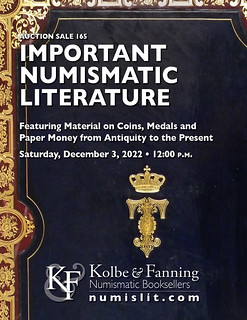 Kolbe & Fanning December 3 Sale
Kolbe & Fanning December 3 Sale
Kolbe & Fanning Numismatic Booksellers are happy to announce that we will be holding our next auction sale on Saturday, December 3, 2022. The sale includes a wide variety of rare and out-of-print works on coins, medals, and paper money from antiquity to the present, including material from over two dozen consignors.
Some highlights of the sale include:
Lot 7: a complete set of Jean Babelon and Pierre d'Espezel's significant journal Arethuse, on ancient art and coinage
Lot 26: Heinrich Dressel's important 1906 publication on the Abukir Find of magnificent ancient gold medallions
Lot 32: Herb Kreindler's heavily annotated personal set of bidbooks from the Gemini series of auctions
Lot 109: an outstanding complete set of Visconti & Mongez's incomparable Greek & Roman iconography, published in seven massive folio volumes
Lot 131: the extraordinary 1756 folio volume illustrating Maria Theresa's silver coin cabinet
Lot 169: Robert W. McLachlan's foundational 1886 Canadian Numismatics, one of only 100 copies printed in book form
Lot 215: a beautifully bound copy of James Wingate's 1868 Illustrations from the Coinage of Scotland, in the original full crimson morocco
Lot 236: the deluxe limited edition of A California Gold Rush History, by Q. David Bowers, extravagantly bound with gold dust from the wreck of the S.S. Central America
Lot 309: a remarkable collection of 84 different auction catalogues issued by Ed Frossard, one of the most important 19th-century US coin dealers
Lot 382: the extremely rare illustrated 1847 second edition of John L. Riddell's The Branch Mint at New Orleans, only the second copy to have come to market.
Register early to bid online
Bids may be placed via post, email, fax or phone, as well as online. Kolbe & Fanning use Auction Mobility as our third-party online bidding platform. Auction Mobility is an app-based platform allowing users the ability to participate in the sale through phones, tablets and computers. To register for the sale, bidders must go to
bid.numislit.com and sign up. Once you have set up an account, you may browse lots, place advance bids, or participate in the live sale online. Those wishing to participate on their devices can download the Kolbe & Fanning app through the Apple or Google Play Store. The sale will also be listed on Biddr and NumisBids in the near future.
The printed catalogue has been mailed to all active customers on our mailing list. As international mail speeds have been inconsistent, we encourage our foreign clients to consult the electronic catalogue in case their printed catalogue does not arrive promptly. A PDF of the printed catalogue has been posted to our main website at numislit.com for those who prefer that format. Bids placed via post, email, fax or phone must be received by December 2, the day before the sale, in order for them to be processed. Advance absentee bids may also be placed at any time online at bid.numislit.com. Live internet bidding will be available during the sale itself through the same platform.
Kolbe & Fanning Numismatic Booksellers LLC is a licensed and bonded auction firm in the State of Ohio. For more information, please see the Kolbe & Fanning website at numislit.com or email David Fanning at df@numislit.com. To register for the sale, go to bid.numislit.com. We look forward to your participation.
To read the Catalogue PDF, see:
https://www.numislit.com/images/upload/kolbefanningsale165.pdf
ALFRED EDWARD JOHNBRIER (1935-2022)
Coin dealer Al Johnbrier of Bowie, MD has passed away. -Editor
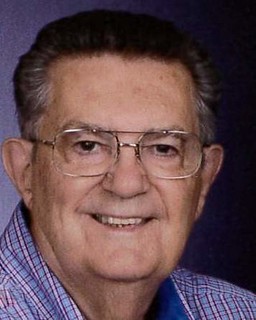 Alfred Edward Johnbrier "Al", 87, of Bowie, MD, passed away on November 8, 2022. Born July 30, 1935, in Pittsburgh, PA, he was the son of Edward William Johnbrier and Mary Ann Fritch Johnbrier.
Alfred Edward Johnbrier "Al", 87, of Bowie, MD, passed away on November 8, 2022. Born July 30, 1935, in Pittsburgh, PA, he was the son of Edward William Johnbrier and Mary Ann Fritch Johnbrier.
Al dropped out of school in the 10th grade to work to support his mother and sister and then joined the USAF. He spent 23 years working with logistics and was stationed in Landsberg, Germany; Fairbanks, Alaska; Charleston, South Carolina; Bangkok, Thailand; McGuire AFB, New Jersey; Air Force One at Andrews AFB, Maryland; OSI, Washington, DC.
He met Joann Youngfleisch in 1960 at a dance at Westview Park in Pittsburgh and they were married on June 2, 1962.
In 1976, he and Joann and their 3 daughters moved to Bowie, MD in anticipation of his retirement from the military in 1977. He enjoyed hunting, fishing, and watching sports, and especially the Pittsburgh Steelers and Pirates.
Al started a second career after his military retirement, allowing him and Joann to travel, always making friends around the country.
To read the complete obituary, see:
Alfred Edward Johnbrier
(https://www.beallfuneral.com/obituaries/alfred-johnbrier)
Paul Kluth writes:
"Al was President of the Bowie Coin Club for many, many years; an active officer with the Silver Dollar Roundtable; active in the sale of VAMs during their height in the market, a good friend of Leroy Van Allen, and an active dealer in the mid-Atlantic including Whitman Baltimore, FUN and the ANA. I personally knew Al and his wife Joann over the years and always enjoyed coin stories of all types with Al & Joann as a friend."
Michael Fey writes:
"I knew John (and his wife) as a dealer, National Silver Dollar Roundtable Officer, VAM Dealer and friend. It's sad to hear that a good man and friend has passed."
Julian Leidman writes:
"I knew Al for at least 50 years. He was a driving force behind numismatics for Prince George's county and all of MD. My condolences to his family."
Michael Merrill writes:
"At shows Al was always cordial with his wife and family in support."
Lori Kraft writes:
"Al was such a character and could find a way to make me laugh or smile whenever dealing with Expo challenges. We asked him to keep us posted on how he was doing over the last year and it just seemed like he couldn't catch a break. We will certainly miss his smiling face."
Paul adds:
"Al served the National Silver Dollar Roundtable as both its President or Treasurer for the longest tenures of anyone and was a Charter Board member along with LeRoy Van Allen."
In 2003 John spoke at the National Silver Dollar Roundtable Silver Dollar Seminar in Long Beach and was recorded by David Lisot. -Editor
To watch the complete video, see:
NSDR Silver Dollar Seminar 2/28/03
(https://nnp.wustl.edu/library/book/578931)
EDWARD KUSZMAR (1941-2022)
I also learned that dealer and show promoter Ed Kuszmar passed away. There's little information online yet, but here are some notes from readers. Ed was a pioneering coin show promoter who started the Baltimore shows now run by Whitman. Whitman Expos General Manager Lori H. Kraft had been in constant communication, and confirmed his passing. -Editor
Kuszmar, Edward Ed"
Promoter (b. 11/29/1941 d. 11/7/2022)
Employed with Control Data. Employed with Plainfield Coins of Boca Raton in 1973. Opened his own shop in 1977.
Promoter with Gordon Berg of the Baltimore Coin and Currency shows.
Julian Leidman writes:
"I knew Ed for more than 50 years. He moved to Florida and had a coin store there and founded a show in central Florida, which was very successful as well. I remember playing cards with him. His son Brian continues to be in the coin business, although they had separate businesses. One of his loves was relaxing in the sun in Florida! His partner was Gordon W. Berg who lives in Maryland."
Drage Vukcevich writes:
"I do recall Ed, from his beard & long hair. He had some interesting coins at his table, and was glad to share his expertise, especially on things like tokens."
David Kahn writes:
"I've known him since I was a kid, attending the Lanham shows in the old parking garage. That became the Baltimore show that was later sold to Whitman. His partner was Gordon Berg, who retired from the coin business. I haven't seen him in years. Whitman keeps his booth at the show, just inside the door."
Dave wrote a bit about the evolution of the Baltimore show in his email newsletter -Editor
Many years ago, I was a regular attendee at a twice-yearly coin show held in Lanham, MD, in an old, decrepit hotel parking garage. The show was...quaint, to put it mildly. There was no A/C and little heat. The floor was sloped to drain water, which made for some interesting table placements, and was a darn good thing, because the roof leaked! Everyone had to dodge the drips when it rained. The supply guy always had plenty of trash bags with him, so he could cover all the supplies! I can remember going to that show as far back as the early-1980's or so, maybe even earlier. The promoters were Gordon Berg and Ed Kuszmar, who were always nice and welcoming to me...very much appreciated by that young collector and vest-pocket dealer.
Why the trip down memory lane? Because that was the show that became Baltimore. In about 1990 or so, Gordon and Ed felt they had outgrown that old facility, and moved the show 35 miles north. It was first held at Festival Hall, which was located on the property adjacent to the original portion of the convention center, until that facility was torn down, and the center was enlarged. From that point, it's been held in the convention center proper, and developed into the juggernaut that it remains today.
To read the complete newsletter issue, see:
It's been 2 years...
(https://us8.campaign-archive.com/?u=b470c7cbe852610934f9181aa&id=413baaba1b)
Michael Merrill writes:
"Ed was always hard working from the start, along with Gordon, in transforming a once cramped, sometimes underwater coin show into ultimately something much grander by the time Whitman took over."
Lori Kraft writes:
"Ed was a difficult loss for me because I always enjoyed our talks and he was extremely supportive when I took over as Whitman Baltimore Expo General Manager. He was quick to respond if I had any questions or concerns."
David Lisot interviewed Kuszmar last year at his Collectorama show in Florida. -Editor
Edward Kuszmar, President, Collectorama Coin & Currency Show, David Lisot, Interviewer, CoinTelevision.com. February 18, 2021. During the last year many larger coin conventions have been cancelled due to the COVID Pandemic. Edward Kuszmar was able to satisfy government bureaucracies and collector concerns by holding the 70th Collectorama Coin & Currency Show in Lakeland, Florida while the Corona Virus was still a threat. Ed explains what precautions were taken and why this convention is different from a normal coin show.
To watch the complete video, see:
CoinTelevision: Collectorama Show Features Coins, Currency & Collectibles During COVID Crisis 2021.
(https://www.youtube.com/watch?v=DyIN3egsjSg)
To watch for an online obituary, see:
Edward Kuszmar
(https://www.palmbeachpost.com/obituaries/pwpb0350108)
All County Funeral Home & Crematory
(https://www.allcounty.com/)
WPNS PAPERS ON THE NEWMAN PORTAL
The latest addition to the Newman Numismatic Portal is a group of papers published by the Western Pennsylvania Numismatic Society. Project Coordinator Len Augsburger provided the following report. -Editor
Western Pennsylvania Numismatic Society Papers on Newman Portal
Newman Portal has scanned the presented papers of the Western Pennsylvania Numismatic Society (WPNS), beginning with the year 1937. Many of these were published nowhere else, and a large number of topics are covered. Sample subjects from the first volume include European cathedral medals, Bryan money, Continental currency, and Washington medals. The accumulation of member papers was unusual for coin clubs during this period and speaks to the level of numismatic practice operative within the WPNS. This group represents part of a larger effort to digitize the WPNS archives.
Link to Western Pennsylvania Numismatic Society papers on Newman Portal:
https://nnp.wustl.edu/library/archivedetail/547894
WPNS is my home club - I'm a Life Member and Past President, and also served for a time as the club's curator. Founded in 1878, the club's extensive archives document many decades of activity. The presentations are often top-notch, and as Len noted, they cover a very wide range of topics. Whatever your own numismatic specialty, it's a good bet one of the WPNS members gave a talk on it.
Illustrated here are sample pages from papers discussing Austrian coins, Sommer Islands coinage, the Swastika on coins, the Feminine Influence on Anglo-Saxon Coins, United State Rarities, and the Chemistry and Mechanics of Coin Housing. Take some time and browse the archive. -Editor
VIDEO: ANTHONY SWIATEK INTERVIEW
The David Lisot Video Library on the Newman Numismatic Portal can be found at:
https://nnp.wustl.edu/library/multimediadetail/522852
We highlight one of his videos each week in The E-Sylum. Here's one from 1986 where David interviews author and dealer Anthony Swiatek. -Editor
ANA Numismatic Personality: Anthony Swiatek
David Lisot, Interviewer.
To watch the complete video, see:
ANA Numismatic Personality: Anthony Swiatek
(https://nnp.wustl.edu/library/book/557342)
CSNS PARTNERS WITH NEWMAN NUMISMATIC PORTAL
The Central States Numismatic Society and the Newman Numismatic Portal are partnering for a three-day symposium at the 2023 CSNS convention. Here's the press release, which includes additional information about the show. -Editor
As part of an ongoing expansion and modernization program for its annual convention, leaders of the Central States Numismatic Society (CSNS.org) are partnering with Washington University's Newman Numismatic Portal (NNP) for a three-day symposium at the 2023 CSNS convention. The NNP Symposium sessions will also be live-streamed and archived for free access at the NNP website, nnp.wustl.edu.
CSNS leaders have also suspended competitive exhibits for the 2023 convention to pause while examining possible changes to exhibit rules.
In my discussions with collectors and show managers, I hear a strong desire to modernize exhibiting. However, there is disagreement in the numismatic community
about competitive awards with some calling for changes in the exhibition rules and others who want to continue with rules that have been in place for decades,
said CSNS
President Mitch Ernst.
We have the opportunity now to do something different and do it right,
he
stated.
This reassessment of our exhibit area is part of the ongoing decisions, changes,
and evaluation we are making to keep CSNS on an upward trajectory. We are
committed to do the best we can in everything we do. It is important to know that every
decision we make at CSNS will always be in what we believe is the best long-term
interest of Central States and all its members; not necessarily what is best for a particular member, dealer, or club, but what is in the best long-term interest of the
Central States Numismatic Society,
emphasized Ernst.
"What worked in the 1970s doesn't work today and hasn't for decades, stated CSNS Convention Manager Larry Shepherd.
We must consider the changing behaviors and desires of collectors and the
abundant amount of available numismatic education on the internet that wasn't an
option 50 years ago. Our one-year sabbatical on competitive exhibits will give us time to
explore changes or alternatives that might deliver a greater return," said Shepherd.
The motto of the Central States Numismatic Society is Building Collector
Community, and evaluation of our exhibit area to determine what changes need to be
made to align with those goals, and the NNP Symposium, are examples of innovative
planning to bring numismatic education to a wider audience,
explained Ernst.
Len Augsburger, NNP Project Coordinator, and Lianna Spurrier, who produces the NNP Symposium on behalf of the NNP, plan to host and livestream six presentations per day during the 2023 CSNS convention. Some sessions may feature material previously shared in an exhibit format, and the Newman Portal invites all potential speakers or exhibitors to contact NNPCurator@wustl.edu for further information.
On behalf of the CSNS Board, we appreciate your understanding as we try to
align our convention education programming with our overall convention goals of being
bigger, better, safer and friendlier,
said Ernst.
The Newman Numismatic Portal (nnp.wustl.edu) is located at Washington University in St. Louis, Missouri and funded by the Eric P. Newman Numismatic Education Society. The NNP is dedicated to becoming the most comprehensive online resource for numismatic research and reference material, with a particular on American coinage and currency. Launched in 2016, the site now includes over 50,000 documents, representing five million pages of scanned and electronically acquired content.
The NNP Symposium hosted its inaugural event in 2020, followed by four additional events in 2021 and 2022. While all previous events have been entirely virtual, the partnership with CSNS will enable them to reach a new audience and expand the outreach of the NNP Symposium, and the NNP as a whole. More information about past Symposia can be found at nnpsymposium.org, and further information about the CSNS partnership will be available in December.
The CSNS 2023 convention will be conducted April 27-29 at the Schaumburg Renaissance Hotel and Convention Center, 1551 North Thoreau Drive, in the Chicago suburb of Schaumburg, Illinois. The 2023 PNG Day will be held there on April 26.
Information about the convention, including information about discount rates for transportation and hotel accommodations, will be available on the CSNS website, CSNS.org.
APPLYING HAMILTON'S 1791 MINT REPORT
Len Augsburger passed along an article by Eric Brothers in the Fall 2022 Financial History Magazine from the Museum of American Finance titled "Applying Hamilton's Mint Report to American Finance and Commerce." Thanks. Here's an excerpt. -Editor
Alexander Hamilton's 1791 Report on
the Establishment of a Mint
(hereafter, the Report
) is an iconic financial
document in which the first Secretary of
the Treasury carefully plotted the future
money of the United States. However,
when Congress considered the Report and
enacted the Coinage Act of 1792, important elements were excluded.
A main theme of Hamilton's Report was
that the national unit of account would be
the dollar. Through images and mottos, as
well as everyday use, the dollar (both in
gold and silver) would promote the bimetallic standard Hamilton desired. It would
also provide a tangible embodiment of
being an American and would help citizens
identify with the United States as a nation,
not just with their individual states. The
idea was for the new American coinage
to push out of circulation the ubiquitous
Spanish-American eight reales (also called
pieces of eight
or Spanish dollars
) and
other international coins, as well as the
myriad state coins then in circulation.
It was important to Hamilton to mint
both gold and silver one-dollar coins. In
Alexander Hamilton on Finance, Credit,
and Debt, Richard Sylla and David Cowen
write, The gold dollar's main purpose was
to make the bimetallic standard real by
having a coin of the same denomination
in both metals.
Congress did not include
Hamilton's gold dollar in the Coinage Act.
In fact, the Mint only produced a gold dollar from 1849 to 1889. However, the Coinage
Act did include the quarter eagle ($2.50),
half eagle ($5) and eagle ($10) gold coins.
Among the themes in Hamilton's Report was ending the circulation of foreign coins within a three-year period. He provided some latitude for the Spanish dollar to remain in circulation for a longer time. The intention was to have all foreign coins brought to the Mint to be melted into bullion and used to strike the new national coinage, with iconic imagery and mottos. This was part of Hamilton's concept of employing American coinage to create connections between the American people and the nascent United States, although the coins were intended for international trade and not solely for domestic consumption.
However, this important proposal was not included in the Coinage Act of 1792, and foreign coins were allowed in commerce as legal tender until the Coinage Act of 1857. Thus, an important and voluminous source of bullion was not available to produce the new national coinage. During the 1790s, silver mining production in the United States was virtually nonexistent. Therefore, Congress' decision to allow foreign coins to continue circulating unabated severely hampered the Mint's ability to produce a large quantity of American coinage for everyday commerce.
Ah, what might have been! The article discusses the fineness of silver coinage and U.S. coinage undervaluation, which led to many being shipped overseas rather than entering commerce. -Editor
The surviving coins today—many of which are great rarities—were the subject of hoarding and possible storage in banks. This begs the question of why, over the course of 40 years, did Congress not once modify the silver to gold ratio? If gold merchants were regularly bringing gold bullion to the Mint to be converted into coins for the sole purpose of export, why did Mint officials not petition Congress to amend the law and charge seigniorage?
Hamilton left the US Treasury in 1795 and died in 1804, and no other financial minds stepped in to successfully confront these challenges. Congress and successive Mint directors discussed and complained about these problems for 40 years, yet nothing was done to fix them.
To read the complete issue on the Newman Numismatic Portal, see:
Financial History (#143)
(https://nnp.wustl.edu/library/book/619614)
HERMON MACNEIL PLASTERS ON THE MOVE
Jim Haas recently published a new book on the life of sculptor Hermon Atkins MacNeil, the creator of the Standing Liberty Quarter and other numismatic products. Tomorrow he's becoming part of numismatic history himself, helping transport fifteen plasters of MacNeil's works to a new home. Here's his report. -Editor
Following MacNeil's death in October 1947, his widow Ceil Muench MacNeil donated at least eighteen plasters to the Swope museum in Terre Haute.
In a call to the curator earlier this year I learned that the space where they had been stored for more than fifty years, was going to be repurposed come spring, and the plasters de-accessed.
They had been offered to College Point's Poppenhusen Institute a decade ago, but there was never any money in the budget to have them packed and shipped to the town where MacNeil had had his studio for almost fifty years. He served on the Institute's Board of Control for thirty of those years and over the course of time, it had acquired four of his works, one of which I donated and another that he had given to the public school I attended from 1948 to 1956. Before I ever knew who he was, I had seen the model of his group Pere Marquette frequently from first through eighth grades. Another work in its collection is one by Carol Brooks MacNeil and his nine-foot model of Portland's Coming of the White Man.
On this coming Monday, November 14th, I'll be driving a rented van to Terre Haute with a current board member and together we will pack and return fifteen of those plasters to the town where they were modeled and to the Institute where he spent much of his time. One of them is his plaster of the Architectural League of New York Medal that he modeled in 1910.
It will then be the repository of almost twenty MacNeil pieces along with every bit of my MacNeil-related research. My goal is to make the Institute a destination site for anyone seeking to do research on MacNeil, and offer the opportunity to see the largest collection of his works anywhere.
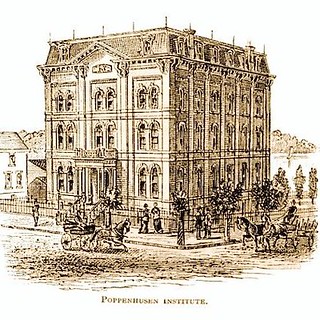 There is still no funding source, but the choice was simple.
There is still no funding source, but the choice was simple.
Good luck on the journey! We'll look forward to learning more about the collections at the Poppenhusen Institute. -Editor
For more information on the Poppenhusen Institute, see:
https://poppenhuseninstitute.org/
To read the earlier E-Sylum article, see:
NEW BOOK: HERMON ATKINS MACNEIL
(https://www.coinbooks.org/v25/esylum_v25n43a02.html)
READER COIN DEAL STORIES
Last week I asked if readers had stories about trades or sales that went particularly well or badly. Jud Petrie shared several. -Editor
1) While attending college in upstate New York I would often go to flea markets, auctions and yard sales. At one flea market a dealer had a cigar box full of Indian Head Cents, mostly 1900-1909, and mostly in VF-XF condition and selling them for the outrageous price (at the time) for $5 each. Going through them I found a 1877 VF+. I held it up and asked "You want $5 for this?" He responded "That's my price, I don't dicker, take it or leave it." Well, I took it! Anytime someone wants to sell me a $1000 coin for $5 I will buy it. I diligently went through about 800 coins looking for S mint marks and other key coins without any success. When asked if I told him it's value I respond with 'Hell no! Let him suffer in ignorance. I paid his price'.
2) Also in the same time frame (1969-1970) I would attend a weekly estate auction where I would buy coins. The night watchman at the auction house approached me and said that he noticed me buying coins and he had some that he wanted to sell. He also didn't dicker, his price was his price, and that was determined to be 50% of the Good price listed in the 1958 Blue Book. Almost all of my Large Cent collection came from him. The only drawback was that I was a struggling college student without access to the funds I would have liked to have.
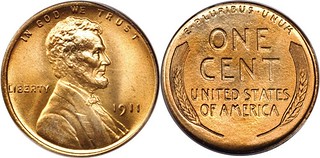 3) Many years later I attended a coin auction not far from home. Amongst the lots were a number of rolls of Lincoln Cents. I opened one roll of 1911 cents, almost all of them were XF-AU. I got it for $10. Apparently I was the only one to examine the contents.
3) Many years later I attended a coin auction not far from home. Amongst the lots were a number of rolls of Lincoln Cents. I opened one roll of 1911 cents, almost all of them were XF-AU. I got it for $10. Apparently I was the only one to examine the contents.
4) About 10 years ago I worked part time for a local auction house that often had coins in their estate sales. I was the underbidder on many coins against a local collector with deep pockets. Luckily for me he didn't collect Canadian coins. I bought a lot for $200 that contained 3 1926 Far 6 nickels, many Newfoundland coins, and over $800 melt value of silver coins.
5) Most recently at a local coin auction I bought a lot of Civil War era items. There were a number of Civil War Tokens, Seated Liberty coins, discharge papers for a soldier from Racine Wisconsin, and...a Sutler token! I got the lot for $175, sold the Sutler Token for $750, added the tokens to my collection and donated the discharge papers to the Racine Historical Society.
Knowledge is power! It also helps to be lucky"
Nice finds. Next up is Alan V. Weinberg. -Editor
I was friends with Bill Anton Jr (having worked for his dad on construction sites during a high school summer) and John Ford, Jr (visiting his Long Island home with Aaron Feldman one weekend ),
both in the early 60's. While I say friends
I mean that with each, they were numismatic mentors
having the same taste as I, but I quickly learned they each would take advantage of me if I wasn't
on my toes.
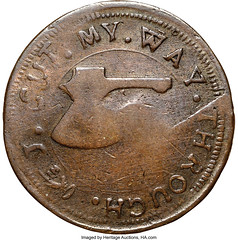 Bill took me to a candle-lit steakhouse dinner and laid out before me SEVEN genuine Higleys three pence, including an EF 3 hammers type with a small counterstamp of several dots on it.
Bill took me to a candle-lit steakhouse dinner and laid out before me SEVEN genuine Higleys three pence, including an EF 3 hammers type with a small counterstamp of several dots on it.
Take your choice at $3750
. I chose a nice VF 1737 Axe Higley which years later I sold to Don Partrick when I bought a house.
But. on another occasion I wandered into the late Howard Hazelcorn's NYC 44th St coin shop ( almost a cubicle ) . He'd just bought the day before a gem proof
EG Fecit 1776 Continental dollar - the finest I've seen to this day, it'd walked into his shop - and quoted me $1500. I questioned the authenticity due to the incredible condition. So I asked Howard permission to telephone my mentor Bill Anton from Howard's shop. I apprised Bill of the coin and its condition and Bill said to
pass
as it was probably a copy. I left and days later revisited Howard's shop only to learn Bill Anton had come in the following day that I had called him and bought the Continental dollar for $1500.
Thereafter, I learned quickly about colonials and human nature. Later that year or next I bought the 2nd finest EG Fecit Continental dollar I've ever seen for $1200 from collector / vest pocket dealer Harry Warshaw. A few years ago I recall a somewhat inferior
gem Unc auctioning for around $150,000.
To read the earlier E-Sylum article, see:
NOTES FROM E-SYLUM READERS: NOVEMBER 6, 2022 : Indian Head Cent Find
(https://www.coinbooks.org/v25/esylum_v25n45a11.html)
THE BOOK BAZARRE
VETERAN'S DAY COIN STORY
Len Augsburger passed along this Veteran's Day weekend story from Sylvia Baer, a professor of literature at Rowan College of South Jersey. Thanks. -Editor
Numismatic Understandings
Wow, that's just overwhelming!
It was 1959 and my grandfather, Max Kuhner, was showing his coin collection to nine year-old me. Overwhelming? Sylvia I love how you gather new words and play with them,
he chuckled. Then he continued, Yes, I've been building this collection ever since I came to America in 1925. I researched and saved and started.
He had come from Germany and as a new immigrant had many challenges and hurdles to his career as an engineer, but he persevered and rose to great prominence in his field. Along with many patents, he was also a designer of water systems for California, dam projects in the mid-west, and he was on the Manhattan Project where he was involved in the development of atomic power and the atomic bomb. We found out about most of these accomplishments (in locked drawers and filed documents) after his death because he was sworn to secrecy for much of his career.
In 1958, he retired. After decades of flying all over the world and being responsible for life and death projects, he decided to settle on 100 acres of wooded land in central Massachusetts. He lived simply and tried to work with the rhythms of nature cutting wood for the fires of winter, tending vegetables to enjoy and to can, clearing two small ponds to canoe on and— after hard frosts—to ice skate. I loved the weekends we would travel from our apartment in New York City to spend there. I would scamper about in the woods and come back with treasures that my previous city-dwelling life had not shown me. See,
grandpa would say to me as I showed him my recent find, that's an acorn. From that tiny little nut-like thing a giant tree will grow. It'll take time, but so much of the power is right there in that small beginning. Like you, Liebchen.
And he'd smile and gently, awkwardly, pat my head.
So when, in November of 1959, he took me into his newly built home office for the first time, was stunned. On one wall there was a lighted cabinet full of carefully displayed coins. He explained his collection to me as I held, one by one, ancient Egyptian, Roman, Chinese, coins. Gleaming metal and rough clay. Each piece with a story. This one I bought in 1937…
Each one with a history. At that time Egypt ruled much of the region. The king…
Over the next few hours he would show me treasure after treasure and tell me so many stories.
Inevitably, my nine year-old self asked, So do you have a favorite?
I couldn't imagine it, but still I was compelled to ask. So much beauty! So much history! Could he pick just one?
Yes, right here,
he said as he reached his hand onto the far left shelf where a light shone prominently. And he held out, to my astonishment, a simple American dime. What's so special about that one?
I sputtered, It's just a plain old dime. I have those at home. It's not even about a king or anything.
I was confused. No,
he said, but it's about life. All of these coins are about life. This one is no different.
And he continued, Jeremy worked as a night janitor in my building many years ago. It was 1941. He was a young man, maybe 20, whose father had come from Ireland and mother from Lithuania. They were very poor. Jeremy was so bright and so interested in ideas and in history. I would see him many evenings when I worked late. We would talk and I would bring books for him to take home to read. One day I was in my office examining a coin I had just gotten—an ancient Roman one—and I showed it to him and told him about it. He was in awe. I told him I was starting to build a collection, and that one day I would display them all and I would invite him to see it. Oh, he was so happy!
Now Grampa paused and looked out the window briefly. I thought maybe he saw something fly by, but his attention quickly came back to the dime in front of us. I traveled a lot in those days and when America went to war, I became involved in a number of projects that kept me away for long periods of time. One day I came back to my office late at night and found this dime and a little note of explanation on my desk. It was from Jeremy who told me that he had enlisted in the war effort. He was going overseas to fight for our country. To fight for freedom.
Now my grandfather stared down at the coin and seemed to read Jeremy's words as he continued, ‘until I get back home again, I want to be part of your collection, so I leave you this coin. I'll be back to get it when the war is over. Then I'll get to see all of that history you are gathering.'
So why do you still have this, Grampa? Why is it still here?
And he answered, Because, small one, he never came back. It is the cruelty of wars that many are killed in battle. Many die. They do not come back. That is all part of history. Wars. Killings. Battles. Freedom. Oppression. Power. People fight and many die. And everyone—every single one—is valuable. So you see, Jeremy's dime is as important to me as this gold Egyptian coin because it represents a human being who was part of the history of our country—of the world. My way to show honor is to collect these coins. Maybe, Sylvia, you can collect something too. Honor people and their lives—all people.
Max Kuhner did not hug. He was not an outwardly affectionate man, but when my father walked into the room to summon us to dinner, he found my grandfather's arms wrapped blanket-like around me with both of us standing silently. Are you two, OK?
my stunned dad asked. We're fine,
I answered, and I'm an acorn right now,
I began as with fierce determination I met his eyes, but I'm going to grow into an oak. And I'm going to collect stories, and tell them and write them because people's lives are important.
Gently but firmly, my grandpa took my hand and we walked slowly together, in step, to the sit with our waiting family at the table.
And so here I am today sharing all of these—my leaves— with you.
To read the complete article, see:
Numismatic Understandings
(https://www.facebook.com/sylvia.baer.9)
NOTES FROM E-SYLUM READERS: NOVEMBER 13, 2022
International Token Web Conference
Quentin Christensen writes:
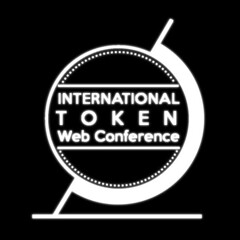 "The International Token Web Conference which has been held for the last three years, started during the original Covid-19 lockdowns. The latest was held earlier this year, online. All of the lectures were recorded and are available online for free at
https://tokenconference.numismatas.com/
"The International Token Web Conference which has been held for the last three years, started during the original Covid-19 lockdowns. The latest was held earlier this year, online. All of the lectures were recorded and are available online for free at
https://tokenconference.numismatas.com/
"Additionally, you can purchase hardcopy books of the proceedings with transcripts of each lecture and colour photos at: https://www.blurb.com/user/tokenconfer
"Lectures this year included:
- "Seven miles from Sydney and a Thousand Miles from Care: The Port Jackson and Manly Steamship Company tokens"
- "Tokens and Textile 1 - The Dutch Perspective"
- "Tokens and Textile 2 - The Indian Perspective"
- "Ferry Tokens of Marstrand, Sweden"
- "Erotic Exonumia"
- "19th Century Bridge Toll Tokens of Central New York State - Cohoes, Troy and Waterford"
Thanks for the report! All the pervs out there are ordering the erotic exonumia book right now. -Editor
To read the earlier E-Sylum article, see:
UPCOMING NUMISMATIC EVENTS: MAY 1, 2022 : International Token Web Conference
(https://www.coinbooks.org/v25/esylum_v25n18a17.html)
New Medals By Jeanne Stevens-Sollman
Sculptor Jeanne Stevens-Sollman of Centre County, Pennsylvania served on the Citizens Coinage Advisory Committee. An E-Sylum reader, I recently corresponded with her and learned about her two newest medals. -Editor
Proceeds of the Zelensky medal will go to Ukrainian refugees. For more information, Jeanne can be reached at j.stevenssollman@gmail.com . -Editor
To read Jeanne's CCAC bio, see:
Jeanne Stevens-Sollman
(https://www.ccac.gov/aboutUs/bio_%20Stevens_SollmanJeanne.html)
Carnegie Museum Coin Sales Question
Earlier this month Kavan Ratnatunga
asked me:
"Do you know the Auction at which the Ceylon Coffee tokens that had been gifted to Carnegie Museum were sold back in 1976?"
I recalled that there were multiple sales (four, I think) in New York, London and somewhere else. I suspected the Ceylon tokens were in a SPINK sale. -Editor
Kavan wrote:
"Spink Auction 30 looked promising, however, Spink has sent me an image showing that Auction 30 has no Ceylon Coffee tokens, so it must be one of the other auctions."
Can anyone help? I lived through the deaccession nightmare after the Carnegie Museum of Natural History decided to sell its coin collection. I was a college student in Pittsburgh at the time and connected with members of the Western Pennsylvania Numismatic Society and the Historical Society of Western Pennsylvania to fight the sale. I gathered petition signatures, wrote Letters to the Editor, attended meetings, etc. In the end the Clapp Large Cent collection was salvaged but most of the rest of the museum holdings were sold. I didn't save a set of the sale catalogs (shame on me)!
So... can anyone list the sales for us? And which one had the Ceylon tokens? Thanks. -Editor
THE STUART GWYNN BANKNOTE PAPER DISASTER
Patrick Parkinson passed along this Online Book and Ephemera Fair item relating to U.S. currency. Thanks - great item. -Editor
Washington, DC, 1864
Autograph letter, signed, from O. Corvin to L.E. Chittenden, January 7, 1864. 3.5 pages in a neat hand on legal-sized lined paper, approximately 1,200 words in all. Folding creases, light soiling, a few short tears; very good.
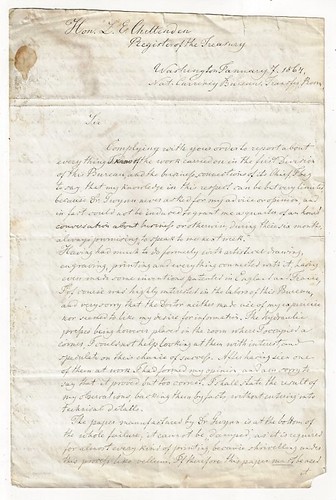 Colonel Otto von Corvin-Wiersbitzki (1812-1886, called simply Otto Corvin in the U.S.) was a German writer and military officer who traveled to the United States to report on the Civil War for the London Times and the Augsburger Allgemeine Zeitung. He also held an appointment in the newly formed National Currency Bureau (now the Bureau of Engraving and Printing), which was formed in 1863 to help fund the war through the issuance of paper currency (in lieu of coins).
Colonel Otto von Corvin-Wiersbitzki (1812-1886, called simply Otto Corvin in the U.S.) was a German writer and military officer who traveled to the United States to report on the Civil War for the London Times and the Augsburger Allgemeine Zeitung. He also held an appointment in the newly formed National Currency Bureau (now the Bureau of Engraving and Printing), which was formed in 1863 to help fund the war through the issuance of paper currency (in lieu of coins).
His letter responds to a request from Chittenden for "a report about everything I know of the work carried on in the First Division of this Bureau." He expresses regret that he does not know as much as he would like, as Dr. Gwynn (Stuart Gwynn, a contractor hired by the Treasury Department to furnish special counterfeit-resistant paper and new presses for printing currency) has refused to consult or speak with him, despite his own considerable experience with "artistical drawing, engraving, printing, and everything connected with it." But he has been able to observe the goings-on in the Division, and reports that Gwynn's methods have essentially led to a disaster:
The paper manufactured by Dr. Gwynn is at the bottom of the whole failure; it cannot be damped, as it is required for almost any kind of printing, because [it is] shriveling under this process like vellum. If, therefore, this paper must be used it can only be done by printing it dry. This cannot be done with the common roller press, for its texture is so very hard that it does not take the ink, which sticks only to its surface if made very stiff and subjected to the enormous pressure of a hydraulic press. The test proved satisfactory; but the paper was printed only on one side. When the back of the notes were printed afterwards, the immense pressure required to produce a print flattened the lines of the face print and spoiled it. The paper of the Doctor is therefore worthless for notes printed either on hydraulic or other presses.
If this is not bad enough, Corwin reports that although "it was expected that these hydraulic presses worked by steam would surpass the roller presses at least in speed," in fact "three minutes and 50 seconds were required for one print on one side, the printing on both sides therefore requiring seven minutes forty seconds, or about eighteen seconds for each single note of 25 on each plate. To print one million dollars in five cent notes on one of these hydraulic presses would require about eleven years," as opposed to less than two years for a roller press. Yet the government has purchased 88 hydraulic presses at "the enormous price" of $1,700 each, (compared to $120 for a roller press), and many of them have broken down, resulting in further costs related to "delay, stopping of work, repairing of pumps and engines, etc." According to Corvin, anyone with printing knowledge should have been able to tell from the start that "the Doctor's papers, and the hydraulic presses made necessary by it, were a dead failure." In fact, the presses have become a standing joke around the office, such that anyone wanting "to give the characteristics of an ineffective thing or humbug...called it hydraulic." It has been difficult "to keep the disgusted printers quiet and induce them to continue their work," but "the reason no person employed in this Division made known this state of things to higher authorities is simply that people expressing themselves too freely about the Doctor's presses, paper, or person were promptly dismissed."
Corwin concludes by explaining that as he was "anxious for the honor and interest of the Department," he had a quiet, confidential word with a personal friend of Treasury Secretary Salmon P. Chase, after which Chase's secretary, H.G. Plants, has paid him a visit and toured the printing facility. The report offered here was presumably the next step in an investigation which within a few months would lead to a Congressional investigation into fraudulent activities within the Treasury Department, and ultimately the arrest of Stuart Gwynn and a loss of faith in Spencer M. Clark, who had contracted with and supported Gwynn. (Clark would go on to further disgrace himself by putting his own face on currency that was reportedly supposed to bear the portrait of explorer William Clark). Several of the specific allegations included in Corvin's report appear in Col. L.C. Baker's official report on the matter, submitted to Congress in June, 1864.
To read the complete item description, see:
1864 Letter to United States Register of the Treasury Lucius E. Chittenden Regarding Significant Failures in Printing Currency
(https://getmansvirtual.com/walkabout-books/1864-letter-to-united-states-register-of-the-treasury-lucius-e-chittenden-regarding-significant-failures-in-printing-currency)
To read an earlier E-Sylum article, see:
QUERY: SPENCER CLARK CORRESPONDENCE SOUGHT
(https://www.coinbooks.org/v20/esylum_v20n03a17.html)
ROOSEVELT OMITS "IN GOD WE TRUST"
Kavan Ratnatunga writes:
"I am going through an interesting collection of old newspapers put online in Singapore. I did not know of this statement by President Roosevelt."
Theodore Roosevelt championed new designs for U.S. coinage, most famously reaching out to sculptor Augustus Saint-Gaudens. The designs did not include the "In God We Trust" motto which first appeared on the two cent piece in 1864. The January 3, 1908 article published a letter from Roosevelt putting forth his reasoning on the matter. -Editor
Kavan also found the letter in the New York Times archive, where it appeared on 11/14/1907.
For comment I reached out to numismatic researcher William Bierly, author of In God We Trust: The American Civil War, Money, Banking, and Religion. -Editor
Bill writes:
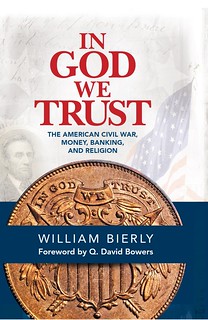 "Yes, this was a big flap at the time and TR caught a lot of heat about it. The Republicans were very nervous about the public reaction as the Democrats were taking advantage of it. But TR seemed adamant about it so a group of Republicans persuaded Congressman Hampton Moore, a friend of the president, to talk with him about it. After a "difficult discussion" TR reluctantly agreed to not veto a bill passed by Congress restoring "In God We Trust".
"Yes, this was a big flap at the time and TR caught a lot of heat about it. The Republicans were very nervous about the public reaction as the Democrats were taking advantage of it. But TR seemed adamant about it so a group of Republicans persuaded Congressman Hampton Moore, a friend of the president, to talk with him about it. After a "difficult discussion" TR reluctantly agreed to not veto a bill passed by Congress restoring "In God We Trust".
"Roosevelt wrote "Congressman Moore says the House Committee wants to pass a bill restoring the motto to the coin. I tell him it is not necessary; it is rot; but the Congressman says there is misapprehension as to the religious purport of it. . . . I repeat, it is rot, pure rot, but I am telling the Congressman if Congress wants to pass a bill restoring the motto, I shall not veto it."
"The press had a field day with the issue and had numerous cartoons mocking both sides of the issue. My book devotes a chapter (17) to the story. I had a lot of fun researching and writing that chapter. Controversy of course surrounds the motto on our coinage to this day ."
Great topic. Thanks, everyone. -Editor
To read the complete article, see:
In God We Trust.
Straits Echo, 3 January 1908, Page 7
(https://eresources.nlb.gov.sg/newspapers/Digitised/Article/straitsecho19080103-1.2.40)
Teddy Roosevelt's letter on his reverential reason for "Dropping In God We Trust" from money.
(https://www.newspapers.com/clip/41216216/teddy-roosevelts-letter-on-his/)
To read the earlier E-Sylum article, see:
NEW BOOK: IN GOD WE TRUST
(https://www.coinbooks.org/v22/esylum_v22n41a04.html)
VOCABULARY TERM: MEDAL
Here's another entry from Dick Johnson's Encyclopedia of Coin and Medal Terminology. A classic. How would YOU define "medal"? -Editor
Medal. A memorial piece, of historic, commemorative, or artistic design, made in any of various ways – basically cast or struck – originally in the shape similar to a coin (but without denomination and certainly not intended to pass for money). In general, the word medal includes all forms of medallic items (except plaques); but also has a specific, numismatic definition: A medal is a round, or nearly so, medallic item between one and approximately three inches (25–80mm) diameter.
Early use of term medal As all-encompasing a term as is medals
– meaning almost everything medallic – the term originally meant even more. It once meant uncurrent coins as well, particularly those housed in collections. Undoubtedly this came from the early Low Latin word medalla which meant a small coin.
Numismatic curator Jean Babelon once wrote: In Italy the term ‘medal' was applied to pieces preserved in collections because they were no longer current and had a purely scientific or historical interest.
This was expressed in the title of a classic work by John Addison in the 17th century, Dialogues upon the Usefulness of Ancient Medals,
was a book on ancient coins!
Medal characteristics. Medals have a very wide appeal, both for their beauty, artistic design, topical subject matter and ability to present a portrait, but also for their historic value. Medals are the most ideal form of commemorating an event or person because of their permanence. We know of events from the past, where and when – and who was involved – because of medals. Medals can exist and pass on these pictorial elements and lettering to people in the future for thousands of years.
Medals are the link between numismatics and virtually everyone in the world. They are the most coveted, distinctive way to honor a scientist, humanitarian or athlete. Every intelligent person in the world knows of the award ceremony of the Nobel Medal in Sweden, or the Olympic medals on the tri-tiered steps at the Olympic games. Medals can be created to honor the school child for excellence in studies, or the inventor of a lifesaving serum. Medals are permanent records of man's achievements, noble events, and personal accomplishments!
Medals are also an ideal medium for portraits. The first use of the medal created by Pisanello in 1438 was to bear a portrait. Royal families took to medals for individual portraits and passed them to other royal families much like we send family photographs today.
Of equal importance to the pictorial element on medals – its DEVICE – is its inscription, the lettering that names, explains, describes or amplifies the device. The obvious shortcoming of lettering is, of course, it has to be in a language that perhaps will not be in existence a thousand years from now. Can anyone read it then?
Just as we observe two-thousand year old coins with inscriptions in a dead language, will the language we put on medals today be understandable in the distant future? Will scholars of the future study English as a forgotten, obsolete tongue? Yet we have no other choice.
The chore rests with the medal designer, its creator. The goal is to design both device and inscription so attractive, so desirable, so enchanting, so appealing to be important enough to want to preserve it. Forever. Desired by both individuals and museums alike to want to posses it for the recall of its substance. To remember why it was issued.
Medal Characteristics:
1) Longevity (Long lasting).
2) Beauty (Artistry).
3) Image (Portraiture, Award, Honor).
4) Commemoration (Celebration).
5) Perspective Charm (Miniature Art).
6) Narration (Picture & Legend).
7) Intimacy (Personal Size).
8) Permanence (Hard Form).
9) Bilateral (Two-sidedness).
10) Accuracy (Documentation).
To read the complete entry on the Newman Numismatic Portal, see:
Medal
(https://nnp.wustl.edu/library/dictionarydetail/516285)
HENRY WITTER BECKWITH (1869-1958)
American Numismatic Biographies author Pete Smith submitted this article on collector Henry Witter Beckwith. -Editor
When I compiled the recent listing of hundred-year-old numismatists, I left off the name of Dr. Henry Beckwith. I apologize, but there is a reasonable explanation.
Henry Beckwith was born on May 7, 1869, in Norwich, Connecticut. His parents were Gordon and Anna Witter Beckwith. He was noted for assembling a collection of high quality large cents sold at auction by S. H. Chapman on April 27, 1923. Walter Breen wrote an article calling Beckwith The First Perfectionist.
In the current version of American Numismatic Biographies, available on the Newman Numismatic Portal, I wrote that He died at age 100.
This followed a series of articles I submitted to Penny-Wise. In the issue of September 15, 1990, I wrote of Beckwith, He died at age 100.
My source for this was a talk C. Douglas Smith made to the EAC convention in Los Angeles. A transcription of the talk was published in Penny-Wise for July 15, 1978.
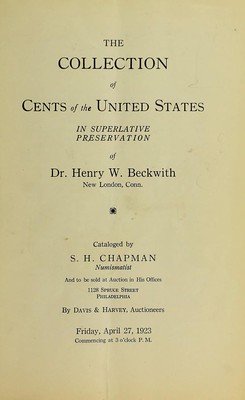 As most of you probably know, Dr. Beckwith had a gem collection of large cents which was sold by one of the Chapman brothers – I think it was S. Hudson, in 1923 – and that was sort of a pre-Helfenstein sale in that it consisted almost entirely of superb uncirculated large cents, and some of the very greatest cents ever were in that sale. The way Sheldon told the story to me when I asked him about the Beckwith sale, was this:
As most of you probably know, Dr. Beckwith had a gem collection of large cents which was sold by one of the Chapman brothers – I think it was S. Hudson, in 1923 – and that was sort of a pre-Helfenstein sale in that it consisted almost entirely of superb uncirculated large cents, and some of the very greatest cents ever were in that sale. The way Sheldon told the story to me when I asked him about the Beckwith sale, was this: Well. About that time. Dr. Henry C. Beckwith was 70 years old. And being a medical man and very practical, he figured he'd be shuffling off his mortal coil pretty soon. So he decided to sell his coins while he still had the power of their disposition. And so he put them into this public auction. They brought about 5 thousand dollars. Many years passed, and the coins were all distributed and Henry Hines bought quite a few of them at the Beckwith sale, And Dr. Beckwith was very interested in the way they were sold, and he kept records of where they went to, And he knew that Hines possessed quite a few of them.
But Dr. Beckwith lived 30 years more after the coins were sold – he lived to be 100 – a centenarian. So he started lusting for some of these coins. Hines was pouring over some of these coins one dark rainy night, burning the midnight oil – and downstairs, like the raven tap-tap-tapping at their door, came a knocking. And lo and behold, it was Dr. Beckwith, and he said, Henry, can't I just look at some of my old coins?
My profiles of Beckwith did not include his date of death. That was a gap I tried to fill this week. Turns out he died in Nahant, Massachusetts, on August 6, 1958, at age 89. At the time of the 1923 auction, he was 53, not 70. It is an amusing story but not supported by the facts.
Doug Smith referred to him as Henry C. Beckwith and that middle initial had me concerned for about an hour. There was no Henry C. Beckwith in the 1900 Census who was a physician. His 1917 Connecticut Military Census registration had his profession as physician and age as 47.
Occasionally I make a mistake. When informed of a mistake by a reader, I correct it. It took 32 years for me to find this one myself.
Thanks, Pete! -Editor
To read the Beckwith sale catalog on the Newman Portal, see:
THE COLLECTION OF CENTS OF THE UNITED STATES IN SUPERLATIVE PRESERVATION OF DR. HENRY W. BECKWITH, NEW HAVEN, CONN.
(https://nnp.wustl.edu/library/auctionlots?AucCoId=22&AuctionId=511010)
To read the earlier E-Sylum article, see:
PURNIE MOORE (1907-2008)
(https://www.coinbooks.org/v25/esylum_v25n45a16.html)
HETTY GREEN, VALUE INVESTOR
Uber-collector Col. E.H.R. "Ned" Green was the son of Hetty Green, once the richest woman in America. Financial History Magazine from the Museum of American Finance has a cover article about her. Here's an excerpt. The illustration is from the July 26, 1905 issue of Puck magazine, where Hetty Green is depicted at the head of the table alongside other turn-of-the-century moguls and financiers including J. P. Morgan, Andrew Carnegie and John D. Rockefeller. -Editor
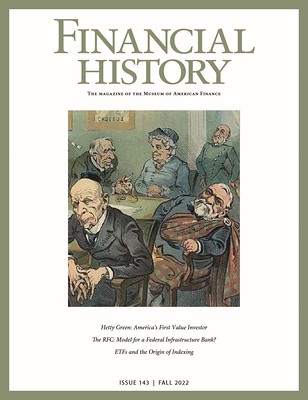 Value investing is a philosophy defined
by the discipline of purchasing assets only
when prices fall comfortably below fair
market value and selling them when prices
exceed fair market value. Ben Graham is
almost universally regarded as the founder
of value investing; however, before he was
born, a woman named Hetty Green also
used similar methods to tame the wild
markets of the Gilded Age. Further, Green
developed these principles instinctively at
an early age, enabling her to profit from
several market panics that ruined many of
her male contemporaries.
Value investing is a philosophy defined
by the discipline of purchasing assets only
when prices fall comfortably below fair
market value and selling them when prices
exceed fair market value. Ben Graham is
almost universally regarded as the founder
of value investing; however, before he was
born, a woman named Hetty Green also
used similar methods to tame the wild
markets of the Gilded Age. Further, Green
developed these principles instinctively at
an early age, enabling her to profit from
several market panics that ruined many of
her male contemporaries.
At the peak of her career, Green was the most creditworthy lender to America's most respected stock operators, corporations and even city governments. Her accomplishments are extraordinary by any standard, but what makes them even more impressive is that she succeeded despite lacking the advantages afforded to men at the time. She could not purchase a seat on the New York Stock Exchange, serve as a director on a corporate board or even exercise the right to vote.
Henrietta Hetty
Howland Robinson was
born on November 21, 1834 in New Bedford, Massachusetts. The Robinsons were
a wealthy family, as Hetty's maternal great
grandfather had amassed a fortune investing in the whaling industry. The family's wealth ensured that Hetty was never
deprived of material needs, but her emotional needs were another matter. Hetty's
father, Edward Robinson, longed for a
male heir and was disappointed when his
wife, Abby, gave birth to a girl; their second child, Isaac, died in infancy. Edward's
disappointment created marital tension,
and Hetty's parents responded by sending
her to live with her aunt, Sylvia Howland,
and grandfather, Gideon Howland, for
most of her childhood.
Hetty showed a keen interest in mathematics and finance as a child. Her interest blossomed when Gideon's failing vision prevented him from reading financial documents and newspaper reports relating to the family business. Each day, Hetty read them aloud to Gideon, and she later credited much of her business education to these daily sessions.
Gideon passed away when Hetty was 13, at which point Hetty's perfect eyesight and burgeoning financial acumen attracted her father's attention. She immediately became her father's eyes, while also learning the practical elements of business management by shadowing him on his daily visits to the New Bedford docks. By the time Hetty turned 15, her financial acumen rivaled that of her father.
Hetty's father exited the whaling business and relocated to New York City. Hetty spent the next six years shuttling between New York and New Bedford. While residing in New York, she met her future husband, Edward Henry Green, who had amassed a substantial fortune of his own. Her father encouraged the marriage, as he was worried about Hetty's ability to manage the family business independently when he was gone. In May 1865, Hetty and Edward announced their engagement, and they were married two years later.
Soon after her engagement, Hetty's father and Aunt Sylvia passed away. Although Hetty was the primary beneficiary on both estates, most of the assets were placed into trust, entitling Hetty only to the income. This enraged Hetty because she knew she could invest the assets more effectively and at much lower cost. She was especially angered by Sylvia's will, and she initiated a drawn-out court case disputing its legitimacy.
Throughout Hetty Green's life, journalists portrayed her as a cruel miser. Like all people, Hetty was imperfect, but her transgressions paled in comparison to most Gilded Age financiers and stock operators. She made most of her money providing capital at reasonable interest rates. In fact, during many panics, she offered capital at below market rates. Outside of her business dealings, Hetty was also a caretaker. There are countless stories of her caring for sick neighbors, and she also played the role of Good Samaritan to complete strangers. For example, while residing in London, she bandaged a delivery man who had fallen from his carriage, while onlookers seemed content to watch him bleed out.
Hetty Green passed away on July 3, 1916. Almost her entire estate, which was valued at more than $100 million, was split evenly between her two children, Ned Green and Sylvia Ann Wilks. Neither of her children had heirs, and upon their passing, Hetty's wealth was distributed to 63 different charitable organizations.
To read the complete issue on the Newman Numismatic Portal, see:
Financial History (#143)
(https://nnp.wustl.edu/library/book/619614)
DAN O'DOWD TAKES ON TESLA
Today the Washington Post published a profile of Dan O'Dowd, the billionaire owner of the blockbuster Tyrant coin collection recently exhibited at multiple conventions. It focuses on his campaign scrutinizing Tesla's "Self-Driving" technology, calling for regulation and testing. Is he today's Ralph Nader? -Editor
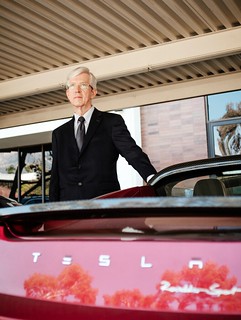 When Dan O'Dowd had his midlife crisis, he bought two near-identical Tesla Roadsters, the first model the electric carmaker ever produced. This year, the 66 year-old tech entrepreneur added another to his collection: a Model 3 equipped with Full Self-Driving Beta — a software program that allows the car to drive on its own on highways and busy city streets.
When Dan O'Dowd had his midlife crisis, he bought two near-identical Tesla Roadsters, the first model the electric carmaker ever produced. This year, the 66 year-old tech entrepreneur added another to his collection: a Model 3 equipped with Full Self-Driving Beta — a software program that allows the car to drive on its own on highways and busy city streets.
The third Tesla is crucial for an unusual hobby: O'Dowd is waging a multimillion-dollar campaign to get Tesla's Full Self-Driving software off the roads — before Tesla CEO Elon Musk follows through with plans to make the tech available worldwide by the end of the year.
O'Dowd, who made his fortune selling software to military customers, has been using the Model 3 to test and film the self-driving software. He's documented what appear to be examples of the car swerving across the centerline toward oncoming traffic, failing to slow down in a school zone and missing stop signs. This summer, he triggered an uproar by releasing a video showing his Tesla — allegedly in Full Self-Driving mode — mowing down child-size mannequins.
O'Dowd's quest has prompted personal attacks and criticism from Musk's legions of supporters. Tesla sent O'Dowd a cease-and-desist letter in response to his child mannequin test. And this week, O'Dowd says a new ad he tried to run on Twitter was rejected.
As a teenager in suburban Michigan, O'Dowd found a passion for coding, learning how to program on an IBM computer.
The year after graduating from the California Institute of Technology, he designed his first debugger,
a computer program that can run through another set of code and find its flaws. The process of methodically fixing errors fascinated him, and set off a lifelong mission against what he sees as an epidemic of terrible, bug-ridden software infiltrating the world.
In 1982 he founded Green Hills Software in Pasadena, Calif., to make operating systems for the tiny computers that were beginning to pop up inside industrial machines, planes, ships and trains. His super-secure approach won over the U.S. military, and his first big sale was to the maker of the B1-B supersonic bomber.
O'Dowd owns most of Green Hills, which was worth just shy of a billion dollars in 2019 when he sold a $150 million chunk of it. Beyond several houses in tony Santa Barbara, he doesn't want to spend his money on the yachts and private islands other wealthy tech founders seem to delight in.
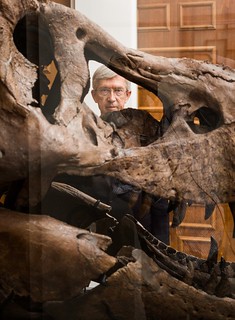 In the past, O'Dowd bought historical artifacts — he owns the world's most expensive coin collection, and has both a Nazi-era Enigma encoding machine and a nearly intact fossilized Tyrannosaurus rex skull displayed in his offices.
In the past, O'Dowd bought historical artifacts — he owns the world's most expensive coin collection, and has both a Nazi-era Enigma encoding machine and a nearly intact fossilized Tyrannosaurus rex skull displayed in his offices.
As he got older, O'Dowd said he began looking for a more lasting project to spend his money on. About a year ago, a colleague told him about Tesla Full Self-Driving videos online. O'Dowd spent hours watching them, and said he was shocked by what he saw.
Why would you put a car on the road that does something that would be illegal, that would cost you your license?
he said. He decided to make Tesla's software the centerpiece of a bigger campaign he has named the Dawn Project to expose what he sees as incomplete and unsafe software being used in cars and power plants and in cybersecurity.
O'Dowd's videos are plentiful online. While I don't have a Tesla, my car does have some now-common features such as lane-keeping assistance and adaptive cruise control. Together they do help when driving in stop-and-go traffic as a well as on the open road. I've gotten used to using them on long drives. So I'm no Luddite when it comes to new technology. But no, I'm not putting my feet up to read a book while the car drives itself, thank you. And having once been rear-ended by a distracted Jeep Cherokee driver, I keep an eye on the rear-view mirror for approching vehicles, Teslas included.
O'Dowd's already waged a Senate campaign and shows no signs of slowing his crusade. So watch for more news about him. So far (as the article notes), regulators have given the whole autonomous vehicle industry room to experiment, and Dan's warnings have fallen on deaf ears. Time will tell, so stay tuned - and keep an eye on the rear-view mirror. -Editor
To read the complete article, see:
The tech CEO spending millions to stop Elon Musk
(https://www.washingtonpost.com/technology/2022/11/13/dan-odowd-challenges-tesla-musk/)
To read the earlier E-Sylum article, see:
TYRANT COLLECTION OWNER DAN O'DOWD
(https://www.coinbooks.org/v25/esylum_v25n12a18.html)
FEIGENBAUM TO BE PNG EXECUTIVE DIRECTOR
John Feigenbaum has been selected by the Professional Numismatists Guild to become the organization's next Executive Director. Here's the press release. -Editor
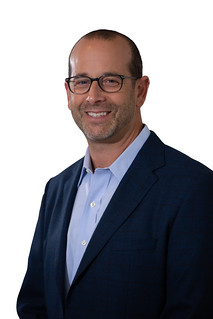 Business executive and lifelong
numismatist John Feigenbaum has been selected by the
Professional Numismatists Guild Board of Directors to become the non-profit organization's
next Executive Director. He will begin a transition period in January with PNG's long-time Executive Director Robert Brueggeman who will be retiring in 2023 after 28 years.
Business executive and lifelong
numismatist John Feigenbaum has been selected by the
Professional Numismatists Guild Board of Directors to become the non-profit organization's
next Executive Director. He will begin a transition period in January with PNG's long-time Executive Director Robert Brueggeman who will be retiring in 2023 after 28 years.
Brueggeman, 78, has been the organization's appointed leader since 1995 and is credited with creating and implementing many projects to enhance the hobby and profession of numismatics, as well as increase consumer and investor education and protection in the marketplace.
Among his accomplishments is the creation of the PNG's Accredited Precious Metal Dealer program; implementation of the PNG Quarterboard and Pennyboard projects to encourage beginning collectors; awarding college scholarships; the PNG Internship Program to help mentor young, prospective future dealers; his role with the Anti-Counterfeiting Educational Foundation Board in overseeing the ACEF's important work; and successfully adjudicating complaints.
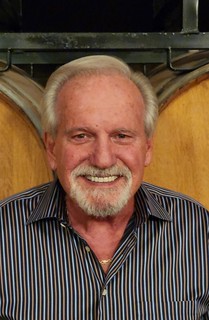 His business experience, including the mechanical engineering profession, the
founding of security company Positive Protection, Inc. in 1981 as well as his work
producing the annual New York International Numismatic Convention, the annual PNG Days, the United Jewelers Expo and Las Vegas Comic-Con, helped Brueggeman turn
around the PNG's financial situation.
His business experience, including the mechanical engineering profession, the
founding of security company Positive Protection, Inc. in 1981 as well as his work
producing the annual New York International Numismatic Convention, the annual PNG Days, the United Jewelers Expo and Las Vegas Comic-Con, helped Brueggeman turn
around the PNG's financial situation.
I inherited the Executive Director's position in an organization with negative
retained earnings, but presently it has approximately $400,000 in retained earnings to
help our member-dealers and therefore also help collectors and investors, the clients of
PNG dealers,
he explained.
His retirement plans include spending more time with his family, including eleven grandchildren and three great-grandchildren.
Feigenbaum, 53, has been attending coins shows since the age of 5 and grew up among coin dealers. He and his father built a rare coin company that was one of the pioneers in the field of mail order and online auctions with custom software designed to advance the hobby.
In 2015, he led an investment group to acquire the acclaimed Greysheet price
guide newsletter. Under his leadership as Chief Executive Officer and President of CDN
Publishing and what he describes as an incredible, dedicated team,
CDN turned an
outdated printed price guide format into a data powerhouse for numismatics. The
company now offers numerous new products from print media to a smartphone and
tablet app, and application programming interface (API) connections for wholesale
users.
When the opportunity to take the reins of PNG Executive Director became
available, I knew I could not turn down the role. The Professional Numismatists Guild is
the most storied brand of its kind in numismatics with an incredibly rich history of
organizing the top dealers in the field in the United States and other countries,
Feigenbaum stated.
Bob Brueggeman has been a tour de force in the PNG and I think there's an
opportunity here to continue to modernize the organization and expand our membership
throughout the profession,
said Feigenbaum. Wherever potential members might be in
the marketplace – at auction houses, in retail marketing firms, mail order companies, or
small independent traders -- we need to be inclusive and inviting to all the new faces. I
aim to spearhead on that.
All members of the Professional Numismatists Guild and its Accredited Precious Metals Dealer program (www.APMDdealers.org) must adhere to a strict Code of Ethics in the buying and selling of rare coins, paper money, and precious metals. For additional information and a list of member-dealers, visit www.PNGdealers.org or call PNG headquarters in Temecula, California at (951) 587-8300.
THE BOOK BAZARRE
RAISING THE BAR ON HOBBY ETHICS
I missed this when it first came out, but stumbled upon it this week and thought I'd share it with readers. It's a blog post by Larry Shepherd. -Editor
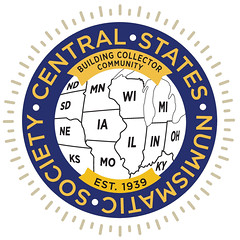 I manage the Convention / Coin Show for the Central States Numismatic Society. We are one of the big 3 non-profit coin shows that exist to serve the hobby. During my career I have been appalled by the frequency that dealers, collectors and hobby organizations tolerate bad, sometimes unscrupulous behavior, when performed by someone with a fat checkbook.
I manage the Convention / Coin Show for the Central States Numismatic Society. We are one of the big 3 non-profit coin shows that exist to serve the hobby. During my career I have been appalled by the frequency that dealers, collectors and hobby organizations tolerate bad, sometimes unscrupulous behavior, when performed by someone with a fat checkbook.
If you have been a loyal reader on this site, you know that I have often called out dealers and numismatic organizations for looking the other way. With the position I have at Central States, I decided it was time for someone to take the lead, and that we should be the ones to do it. The segment below was part of my column in the Summer edition of the Centinel, Central States' quarterly magazine for its membership:
We are Raising the Bar
We are a Midwestern organization, and Midwestern values will stand at the heart of everything we do. We believe in honesty, ethics, fairness and transparency; good people and the Golden Rule.
We've all seen numismatic organizations, groups, and individual dealers look away, or hide their head in the sand at shady or unfair practices; especially when the offending party has a check in their hand. It is our intent to take the lead and to raise the bar on those matters.
For example, a well-known dealer, a fixture at most large shows, despite being notorious for many years for bad checks and bad deals, will no longer be allowed to enter our show to do business. Another big-time dealer, whose parent company was a firm that became the focus of a massive Federal Trade Commission (FTC) investigation for ripping off the public, will not be welcome as a table holder, regardless of his status as a Coin World Top 60.
We intend to enforce a message, If ripping off seniors, retirees and the uneducated public is part of your business model, don't come around us with your check — not for tables, not for sponsorships, not for donations. We don't value finance over integrity.
End of segment.
To read the complete article, see:
It's Time to Stop Looking the Other Way on Ethics
(http://www.simcocoins.com/its-time-to-stop-looking-the-other-way-on-ethics/)
MARIA THERESA'S SILVER COIN CABINET
One of the highlights of the upcoming Kolbe & Fanning December 2022 numismatic literature sale is this rare volume illustrating silver coins in the cabinet of Maria Theresa. -Editor
The Magnificent 1756 Folio Volume Illustrating Maria Theresa's Silver Coin Cabinet
131 Duval, Valentin Jameray. MONNOIES EN ARGENT, QUI COMPOSENT UNE DES DIFFÉRENTES PARTIES DU CABINET DE S. M. L'EMPEREUR, DEPUIS LES PLUS GRANDES PIÈCES, JUSQU'AU FLORIN INCLUSIVEMENT. Vienne: Chez Jean Thomas Trattner, Imprimeur et Libraire de la Cour, 1756. First edition. Folio [47 by 32 cm], contemporary full brown calf, sides paneled in double gilt filets; spine with six raised bands, richly decorated in gilt with a floral motif; crimson morocco label, gilt, in second compartment; board edges and turn-ins decorated in gilt; red page edges; marbled endpapers. (4), 358 pages; engraved printer's device on title; exceptionally fine engravings of some 2500 coins and medals throughout. Early handwritten index laid in, with additional genealogical note. Binding a bit worn, but sound, with head and tail of spine professionally restored some time ago. Lower fore-edge corner discolored throughout from old staining: while obvious, it never reaches the coin images. Very good. $5000
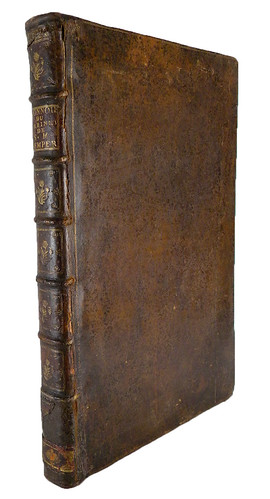 A monumental work, comprising a superbly illustrated record of large European silver coins in the remarkable Vienna coin cabinet. While the text is minimal, the quality of the illustrations (by Johann Christoph Winkler) is very high, and the extraordinary number of them makes these volumes a landmark of numismatic study.
A monumental work, comprising a superbly illustrated record of large European silver coins in the remarkable Vienna coin cabinet. While the text is minimal, the quality of the illustrations (by Johann Christoph Winkler) is very high, and the extraordinary number of them makes these volumes a landmark of numismatic study.
Duval (1695–1775), though of humble origin, became a renowned French scholar. When Duke Francis Steven became Grand Duke of Tuscany, Duval accompanied him as librarian to Florence and, when the Duke married Maria Theresa and became Francis I, Holy Roman emperor, Duval was called upon to preside over the collection of coins and medals at Vienna. He was instrumental in the development of the court's magnificent coin collection and Duval undoubtedly inspired his illustrious successor, Father Joseph Hilarius Eckhel.
A comparable copy of this magnificent work in the Anders Frösell Library was sold by us in 2010 for $11,000 hammer. A volume on the collection's gold coins was published in 1759. In their entry 2402, Engel & Serrure discuss the project as a whole:
Cette somptueuse publication, l'une des plus belles qui aient été faites sur la numismatique de la fin du moyen âge et des temps modernes, se compose d'une suites de planches de monnaies, gravées sur cuivre avec le plus grand art, par un artiste viennois, J.-C. Winkler. Le seul texte qui accompagne les dessins est une suite de titres explicatifs imprimés au-dessus des vignettes. L'ordre adopté par Duval pour le classement des monnaies du Musée de Vienne est le suivant : Souverains pontifes, archevêques, évêques, abbés et chapitres, ordres militaires, empereurs, rois, électeurs et princes souverains de l'empire, princes, comtes et barons de l'empire, princes de Courlande, de Transylvanie, etc., maisons souveraines limitrophes ou enclavées dans la France, souverains d'Italie, républiques, provinces et villes libres.
Here's a Google translation of the text. -Editor
This sumptuous publication, one of the most beautiful that has been made on the numismatics of the end of the Middle Ages and of modern times, consists of a series of coin plates, engraved on copper with the greatest art, by a Viennese artist, J.-C. Winkler. The only text that accompanies the drawings is a series of explanatory titles printed above the thumbnails. The order adopted by Duval for the classification of the coins of the Vienna Museum is as follows: Sovereign pontiffs, archbishops, bishops, abbots and chapters, military orders, emperors, kings, electors and sovereign princes of the empire, princes, counts and barons of the empire, princes of Courland, Transylvania, etc., sovereign houses bordering or enclosed in France, sovereigns of Italy, republics, provinces and free cities.
Brunet 29744. Dekesel D161. Engel & Serrure 2401. Graesse II.456. Lipsius pages 265 & 410. Ex François-Pierre du Pont, Seigneur de Romémont (d. 1792) Library, with his engraved bookplate; ex Baron James Eduoard de Rothschild Library (1844–1881), with his engraved bookplate; ex Bücherei des Architekten-Verein zu Berlin, with their ink stamp in at least two places.
For more information on the sale, see:
https://www.numislit.com/
SEDWICK TREASURE AUCTION 32 RESULTS
Here's a press release with results of the recent Daniel Frank Sedwick Auction 32. -Editor
Unique Declaration of Independence medal leads record $4.27 million Sedwick auction
A unique American silver medal depicting the presentation of the Declaration of Independence set a new record during Daniel Frank Sedwick, LLC's Nov. 3 & 4 Treasure Auction 32.
The live online and floor auction was itself a record sale for the firm with over $4.27 million sold across 1,622 lots.
The large proof silver medal was created in 1851 by artist Charles Cushing Wright. It was the only example he struck in silver and has been called Wright's masterpiece.
On one side, the medal depicts the presentation of the draft of the Declaration of Independence to the Continental Congress on June 28th, 1776. Founding Fathers John Adams, Thomas Jefferson, and Benjamin Franklin along with Richard Sherman and Robert R. Livingston on the drafting committee are shown presenting the draft Declaration to the president of Congress, John Hancock. Of the 47 men present in the entire scene set at Independence Hall, 42 of them were signers of the Declaration of Independence. The design is based heavily upon the famous 1818 painting by John Trumbull that currently hangs in the US Capitol rotunda.
The other side of the medal presents a highlight of formative American historical events from
the "DISCOVERY OF NORTH AMERICA BY THE ENGLISH.JLY.3.1497 to ASSAULT ON QUEBEC BY
AMERICANS.DEC.31.1775.
A vignette of Europeans landing on America's shores as a Native
American awaits graces the top of the reverse design. The bottom scene depicts a developed,
busy American harbor.
The entire ownership pedigree for this unique medal can be traced dating back to Charles Ira Bushnell (Chapman auction of June 1882, lot 1274), the Garrett Estate (Bowers & Ruddy auction of April 1981, lot 1910), Julian Leidman (Bowers & Merena auction of April 1986, lot 4126), and Charles A. Warton (Stack's Bowers auction of March 2014, lot 2077), subsequently purchased by numismatist John Adams in the Stack's Bowers auction of August 2018 (lot 46).
NGC graded the medal as MS 62 though a specimen designation is more appropriate to describe this unique piece.
The pre-sale estimate for the lot was $25,000 and up. After spirited bidding, both online and via phone, the medal sold for $168,000. Thus, another pedigree for this unique medal has been added – as part of the Resolute Americana Collection.
We were honored to offer this uniquely American medal at auction and see it sell so well,
said Daniel Frank Sedwick, president and founder of Daniel Frank Sedwick, LLC. It's really
fitting that the prior owner, John Adams, is himself related to Founding Father John Adams
depicted on this medal.
Shipwreck treasure also saw considerable interest during the auction with many lots surpassing their high estimates.
A unique gold bar recovered from the Corrigan's
wreck site of a 1715 Fleet treasure ship at
Vero Beach, Florida attracted heavy bidding.
The gold ingot, weighing 915 grams and marked with a fineness of 22k, was made in Colombia before being shipped to Spain in the ill-fated fleet. It bears the royal tax stamp as well as a decorated assayer/foundry stamp (B)ARBACO(A)S indicating its origin from the important Colombian gold mining town, Barbacoas. Salvors recovered the bar in 1983 and it went into the collection of 1715 Fleet investor Don Anderson.
With an estimate of $60,000 to $90,000, considerable bidding led to a final sale price of $132,000 for the 1715 Fleet gold bar.
The highest selling coin lot in the auction was an extremely rare gold Venezuela essai 5 venezolanos dated 1875-A in its first auction appearance ever.
The coin, graded by NGC as Proof 62 Cameo, is one of ten struck by the by the Paris Mint for the nation of Venezuela. Only five examples, including this piece, are in private hands. Another four are in museums like the Banco Central in Caracas, Venezuela. The tenth example is buried in the cornerstone of the Simon Bolivar statue by Adamo Tadolini in Plaza Bolivar also in Caracas.
The rarity and importance of this coin in Latin American numismatics sparked a bidding war. The coin ultimately sold for $78,000 on a pre-sale estimate of $30,000 to $45,000.
Other top lots in the sale include:
- Lima, Peru (State of North Peru), gold 4 escudos, 1838 M, extremely rare, graded NGC AU 53, finest known in NGC census, ex-Hammel, ex-Goodman (lot 1040) sold for $66,000.
- Philippines (under Spain), silver 8 reales, crowned Isabel II "Y.II" countermark (Type VI, 1834-37) on an Argentina (River Plate Provinces), 8 soles, 1815 FL, Potosi mint, graded NGC AU 53, c/s AU standard (lot 1048) sold for $45,000.
- Venezuela (struck at the Paris Mint by Barre), silver essai 1/2 real, 1863 E, graded NGC SP 61 (lot 1114) sold for $45,000.
- Lima, Peru, gold bust 8 escudos, Ferdinand VI, 1758 JP, graded NGC MS 63, ex-Karon, ex- Segarra (lot 1020) sold for $33,600.
- Guanajuato, Mexico, gold 20 pesos, 1872 S, NGC MS 66, finest known in NGC census (lot 1008) sold for $31,200.
- Segovia, Spain, gold 4 excelentes, Ferdinand-Isabel, mintmark at top, denomination Arabic 4 above K at bottom between busts, rare, NGC AU 53 (lot 1065) sold for $26,400.
- Potosi, Bolivia, cob 8 reales Royal (galano), Louis I, 1727 Y, very rare, graded NGC AU details / holed (lot 485) sold for $24,000.
- Seville, Spain, gold milled 8 escudos, Philip V, 1701 M, florets flanking fleece, 8-S-8-M in tressure-dimples, graded NGC MS 65, finest known in NGC census (lot 1080) sold for $22,800.
- Panama, proof silver 25 centimos, 1904, very rare, graded NGC PF 64 (lot 1015) sold for $21,000.
Daniel Frank Sedwick, LLC's next Treasure Auction will be held in early May 2023. Interested consignors should contact the company by email at office@sedwickcoins.com. Full auction results are available at auction.sedwickcoins.com.
To read the earlier E-Sylum articles, see:
SEDWICK TREASURE AUCTION 32 ANNOUNCED
(https://www.coinbooks.org/v25/esylum_v25n42a25.html)
WRIGHT'S DECLARATION OF INDEPENDENCE MEDAL
(https://www.coinbooks.org/v25/esylum_v25n44a14.html)
NUMISMATIC NUGGETS: NOVEMBER 13, 2022
Here's a selection of interesting or unusual items I came across in the marketplace this week. Tell us what you think of some of these. -Editor
Peter I, 1682 / 1689–1725. 1721 ruble (Cyrillic), Moscow, Kadashevsky mint. 29.17 g. Of great rarity in this condition. Splendid specimen with fine mint luster, min. scratches, almost uncirculated.
From the upcoming Universum Coins sale. -Editor
To read the complete lot description, see:
Lot 164. RUSSLAND GROSSFUERSTENTUM / KAISERREICH
(https://www.sixbid.com/en/universum/10070/europaische-munzen-und-medaillen/8679714/russland-grossfuerstentum-kaiserreichpeter-i)
Ingle System Token Dispenser, Dayton, Ohio, Circa 1911. Quarter sawn oak cabinet with beautiful embossed two sided marquee
Very cool item for a coin shop or numismatic office. -Editor
To read the complete lot description, see:
Ingle System Token Dispenser, Circa 1911
(https://www.barnebys.com/auctions/lot/ingle-system-token-dispenser-circa-1911-l90MaqIJ_ww)
1895 South Africa PAUL KRUGER - OPENING OF THE DELAGOA RAILWAY bronze 44mm
Gold Krugerrands too pricey? How about a nice Kruger medal? -Editor
To read the complete lot description, see:
1895 South Africa PAUL KRUGER - OPENING OF THE DELAGOA RAILWAY bronze 44mm
(https://www.ebay.com/itm/155248686270)
Very Rare Bronze Ambassador Bridge Medal 1930 Joseph Bower worker thank you art deco female nude. City of Detroit and Windsor given by Joseph Bower in 1930 as a thank you to those who helped him get the job done. Identical large bronze tablets at the end of each bridge. Art deco and streamline modern architectural design. Thick mold. About 1 pound. Two round balls on bottom to bring up to a slight slant. Made by Medallic Art Co. New York. Seminude art deco female figure with cloth. Text on front - The Visible Expression of Friendship in the hearts of two peoples with like ideas and ideals. American eagle top left corner. British flag top right. Great condition. NOT a reproduction. Height 1/4. Width 2 3/4 x 4.
Nice Art Deco Medallic Art Co. product. -Editor
To read the complete lot description, see:
Very Rare Bronze Ambassador Bridge Medal 1930 Joseph Bower worker thank you art
(https://www.ebay.com/itm/363920901449)
3.75L x 3.75W x 0.75H This impressive 1935 California annual yachting championship medal is in good condition with wear commensurate with age. No major damage to notate. Some minor discoloration visible. This is a marvelous piece for your collection!
No yacht required - buy the medal and lord it over all your jealous friends. -Editor
To read the complete lot description, see:
1935 California Annual Yachting Championship Medal
(https://www.invaluable.com/auction-lot/1935-California-Annual-Yachting-Championship-Medal-8-c-43345D49F9)
Damien Hirst, British b. 1965- What he will do 3056, The Currency, 2016; unique enamel on handmade paper from an original edition of 10,000, with 5,149 remaining, signed, titled, dated and numbered 3056, 21 x 29.7 cm, (unframed) (ARR) Note: Hirst aimed to challenge the concept of value through money and art,
forcing buyers of his NFT project The Currency
to decide between owning the physical artwork or the digital token connected to it. The project consisted of 10,000 unique NFTs that were each associated with corresponding artworks the British artist made in 2016. No two colours used in the artworks are the same, and each is stamped by the artist with a microdot and a hologram of Hirst's visage. Hirst announced that his collectors would have to make a choice between the physical artwork and its digital version; asking them, in effect, to vote for which had more lasting value.
This is the first time I've seen one of these on the resale market. See our earlier articles for background. -Editor
To read the complete lot description, see:
Damien Hirst, British b. 1965- What he will do 3056, The Currency, 2016;
(https://auctions.roseberys.co.uk/m/lot-details/index/catalog/668/lot/213574)
To read the earlier E-Sylum articles, see:
THE CURRENCY BY DAMIEN HIRST
(https://www.coinbooks.org/v24/esylum_v24n32a30.html)
SALES OF THE CURRENCY BY DAMIEN HIRST
(https://www.coinbooks.org/v24/esylum_v24n36a29.html)
UPDATE: THE CURRENCY BY DAMIEN HIRST
(https://www.coinbooks.org/v25/esylum_v25n31a27.html)
COINS AND STATUES FOUND IN ITALY MUD
David Sundman passed along this article about coins discovered in Italy alongside a trove of interesting bronze statues. Thanks! -Editor
A trove of more than 20 bronze statues discovered buried in thermal mud at a Tuscan spa town is the biggest find of its kind in Italy and will rewrite ancient Roman and Etruscan history, experts claimed.
The two dozen statues and votive offerings, as well as nearly 6,000 silver, gold and bronze coins, were found last month deep in an ancient thermal bathing pool excavated in San Casciano dei Bagni near Siena.
Most bronze statues from antiquity were later melted down, which is why this collection is the most important find in the Mediterranean in decades — there are inscriptions with the names of gods we've never heard of,
said Massimo Osanna, the director-general of museums at Italy's culture ministry.
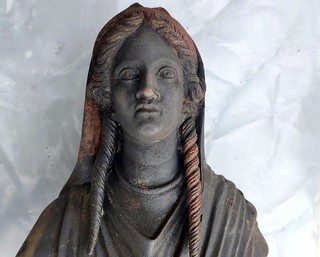 The statues, which include Apollo and Igea, the ancient Greek god and goddess of health, were offerings to the deities by wealthy families at the site where thermal water gushed from the earth.
The statues, which include Apollo and Igea, the ancient Greek god and goddess of health, were offerings to the deities by wealthy families at the site where thermal water gushed from the earth.
One states ‘this statue and six others were given for the health of my wife' — these people were clearly the local elite,
Osanna said.
What is emerging from the mud at San Casciano dei Bagni is a unique occasion to rewrite the history of ancient art, as well as the handover from the Etruscans and Romans in Tuscany,
he added.
He added: The statues have wrinkles, which is typical of that Roman realism.
David writes:
"This is a very impressive find of bronze statues and coins. The photo of the coins is great and there are many easily identifiable Roman sestertii and as in the plastic tub. It will be interesting to follow later reports on this hoard."
To read the complete article, see:
By the gods! Ancient bronze statues rise from mud in Italy
(https://www.thetimes.co.uk/article/by-the-gods-ancient-statues-rise-from-tuscan-mud-c5gz0jsn5)
ROMAN GOLD COIN FOUND IN WHETSTONE
A first-time metal detectorist unearthed a Roman gold coin. -Editor
A metal detectorist has literally struck gold on his first ever hunt - finding a Roman coin reportedly worth thousands in the grounds of his grandmother's home. Austen Perry, 29, who currently lives in Bradford, made the historic find on Saturday November 5 after finally being able to afford a metal detector of his own following a life-long passion for the hobby.
He knew his grandmother's home in Whetstone had plenty of grounds to examine and came back to the county to try out his new piece of equipment. And within an hour his detector beeped.
Rather than it just being a common or garden bottlecap tucked away in the earth, Austen had uncovered a Roman coin. The find took Austen by complete surprise as he never expected to find anything so valuable on his very first hunt.
I've been told by other metal detectorists that it can take years to find something like this and I did it on my first attempt. It's mad and really hard to get your head around.
The coin depicts that of Roman emperor Allectus who ruled between 293 and 296. Little is known about his rule, but coins of the emperor have turned up before. Early estimates from fellow detectorists have said Austen's find is worth around £1,200 - an amount that is yet to be verified - but the coin has been reported as treasure to the authorities.
Found via The Explorator newsletter. To subscribe to Explorator, send a blank email message to: explorator+subscribe@groups.io. -Editor
To read the complete article, see:
Metal detectorist finds Roman coin worth thousands on first ever hunt
(https://www.leicestermercury.co.uk/news/local-news/metal-detectorist-finds-roman-coin-7809304)
COIN MAY BE OLDEST FOUND IN CANADA
A gold Henry VI quarter noble was found last year in Canada, and it may be the oldest-known English coin found in the country. Here's a press release from the Newfoundland government. -Editor
A gold coin that was recently discovered on Newfoundland's south coast may be the oldest-known English coin found in an archaeological context in Canada.
The coin was found during the summer of 2022 by Edward Hynes, who reported it to the Provincial Government as required under the Historic Resources Act.
Consultation with Paul Berry, former curator of the Bank of Canada's Currency Museum, indicates the coin is a Henry VI quarter noble, minted in London between 1422 and 1427. The coin would have been a sizeable amount of money in the 1400s, valued at 1 shilling 8 pence.
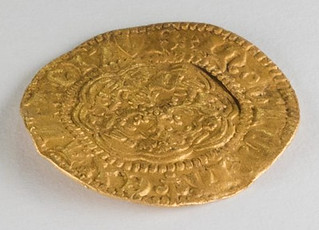 In 2021, a silver coin minted in the 1490s, was found at Cupids Cove Plantation Provincial Historic Site. At that time, it was considered the oldest English coin ever found in Canada.
In 2021, a silver coin minted in the 1490s, was found at Cupids Cove Plantation Provincial Historic Site. At that time, it was considered the oldest English coin ever found in Canada.
Exactly how the gold quarter noble coin made its way to Newfoundland and Labrador is a mystery; however, Mr. Berry says the coin was probably not in circulation when it was lost.
Research on the coin is continuing and further work on the site where it was found may be conducted in the future.
To read the complete press release, see:
Gold Coin Found on Island of Newfoundland's South Coast May be Oldest Ever Found in Canada
(https://www.gov.nl.ca/releases/2022/tcar/1109n05/)
Tom Kays and others passed along additional articles on the topic. Thanks. -Editor
For additional articles, see:
600-YEAR-OLD COIN MAY BE OLDEST FOUND IN CANADA
(https://www.heritagedaily.com/2022/11/600-year-old-coin-may-be-oldest-found-in-canada/145160)
Gold coin discovered in Newfoundland could be oldest English coin in Canada
(https://www.cbc.ca/news/canada/newfoundland-labrador/old-gold-coin-nl-1.6646200)
600-year-old gold coin discovered in Newfoundland could be oldest found in Canada
(https://www.thepeterboroughexaminer.com/ts/news/canada/2022/11/09/600-year-old-gold-coin-discovered-in-newfoundland-could-be-oldest-found-in-canada.html)
HURRICANE NICOLE SURFACES ARTIFACTS
In the wake of Hurricane Nicole, Florida beachcombers are finding coins and other artifacts. -Editor
Right after and — believe it or not — even during hurricanes, there is a group of brave souls who take to the shoreline.
Treasure hunters seize an opportunity to get an even better chance of finding coins, jewels and artifacts from Spanish shipwrecks from the 1700s.
These hunters were busy combing the beaches and unearthing shiny pieces of Treasure Coast history.
Hurricane Nicole's pounding waves and storm surge eroded the coastline. But that also lured Jonah Martinez to the shore in search of treasure.
"When Mother Nature does an event where it takes sand away on an extreme level, that's when you find the stuff," Martinez said. "People like doing this, and that's how stuff gets found, and they rewrite history."
He's got hunting for long-lost coins, jewels and artifacts from Spanish shipwrecks down to a science.
When storms come, he gets to work.
"It's definitely 'go time.' Hurricanes, cold fronts are great," Martinez said. "I take advantage of the change of tides, every cycle during the storm while the storm is going on, as the storm is leaving."
Now, he's got new company while he is on his hunts. His 16-year-old daughter, Kaylee, has joined him combing the beach.
"Hurricane Ian, that was my first time actually detecting with my dad on the beach," Kaylee said.
Hurricane Ian gave her her first taste of treasure.
"I had never found a silver coin. This was like my first coin ever," she said. "He grabs it out of the pile and we were just sitting there freaking out."
Not only did she find silver but also a gold coin.
"I'm shaking because I'm like, 'There's no way!' Kaylee said. "I opened my hand and there is a little gold coin in my hand. I'm speechless."
To read the complete article, see:
Treasure hunters discover artifacts unearthed by Hurricane Nicole
(https://www.wptv.com/news/treasure-coast/treasure-hunters-search-for-artifacts-following-hurricane-nicole)
CHARLES BARBER'S FERRACUTE PATTERNS
Chris Bulfinch published a Stack's Bowers blog article this week on Charles Barber's Ferracute patterns for the Chengtu Mint. The lot sold for $22,800. -Editor
In 1896 the Chinese government contracted the Ferracute Machine Company to produce coin presses for a new mint in Chengtu in Szechuan Province. Ferracute contacted the U.S. Mint, one of its customers, about producing pattern coins to showcase the capabilities of its presses. Charles Barber, then chief engraver at the Mint, produced a set of patterns based on the Kwangtung dollar; in 1896 or early 1897, patterns were struck using Barber's dies. Work on the presses was completed in March 1897.
Barber's patterns were shipped to Sichuan alongside the Ferracute presses, a lengthy journey of 13 months. The dies were badly damaged, submerged in the Yangtze River for six weeks after the riverbank on which the shipment was being stored flooded. A few patterns were produced from the rusted dies. Engravers at the Chengtu Mint attempted to recreate the dies but, according to numismatic historians, were unable to replicate the detail of the Ferracute patterns (as Barber's pieces are known). Only a handful of the patterns produced from the original dies survive. The Chengtu Mint was in operation by June 1898.
Dragon Dollars and their subsidiary denominations were first issued in 1890, struck initially at the Kwangtung Mint. The reverse dragon motif from which the coins' nickname is derived is perennially popular with collectors. Examples of obscure pattern and rare regular issues often command massive prices and are prominently featured in auctions around the world.
Modern reproductions of Barber's patterns are available to collectors today, produced in gold, silver and brass by the Smithsonian in 2018. Ellen Feingold, curator of the Smithsonian's National Numismatic Collection, said at the November 2017 opening of an exhibit featuring the coins, In the late 19th and early 20th centuries, China sought to set up provincial mints and produce struck coinage en masse, but it did not have the technical capabilities to manufacture the necessary minting equipment. Representatives of private overseas firms, including American firms, traveled to China and worked with Chinese officials to design, manufacture, and export minting equipment for multiple Chinese mints. Americans even engraved designs for some of China's most iconic modern coins from that period. For example, the Ferracute Machine Company of Bridgeton, New Jersey, worked with U.S. Mint Chief Engraver Charles Barber to produce brass gilt proof pattern coins for the Sìchuan province around 1902.
A set of the Barber patterns, certified by NGC, was exhibited at the 2017 ANA World's Fair of Money. Stack's Bowers Galleries recently sold a brass 3.6-candareens (5-cent) Ferracute Pattern in our October 2022 Hong Kong sale, where it realized $22,800, more than twice its $5,000 to $10,000 estimate.
To read the complete article, see:
DID YOU KNOW THAT CHARLES BARBER DESIGNED A DRAGON DOLLAR IN THE EARLY 20TH CENTURY?
(https://stacksbowers.com/did-you-know-that-charles-barber-designed-a-dragon-dollar-in-the-early-20th-century/)
To read the complete lot description, see:
(t) CHINA. Szechuan. Brass 3.6 Candareens (5 Cents) Pattern, ND (1898). New Jersey (Ferracute) Mint. Kuang-hsu (Guangxu). PCGS SPECIMEN-63.
(https://auctions.stacksbowers.com/lots/view/3-YRNCN/t-china-szechuan-brass-36-candareens-5-cents-pattern-nd-1898-new-jersey-ferracute-mint-kuang-hsu-guangxu-pcgs-specimen-63)
RARE SYDNEY COVE MEDALLION OFFERED
Back in 2010 we discussed the rare Sydney Cove medallion commemorating the founding of European settlement in Australia. An example is being auctioned November 16 by Lyon & Turnbull in Edinburgh, Scotland. -Editor
An exceptionally rare 18th-century ceramic medallion produced to commemorate the founding of modern Australia will be sold live and online by Edinburgh auctioneers, Lyon & Turnbull.
The Sydney Cove Medallion, valued between £30,000 and £50,000, is slightly smaller than a digestive biscuit.
It was made in 1789 from clay which was dug up at Sydney Cove, now Sydney Harbour.
The clay was sent back to Britain in a box to Sir Joseph Banks at the Royal Society.
The famous explorer and naturalist had travelled on Captain Cook's first voyage to New South Wales on board Endeavour in 1770.
Banks then sent a sample of the clay to revolutionary British potter and industrialist, Josiah Wedgwood, for experimentation.
The medallion is being sold on Wednesday November 16 as part of Lyon & Turnbull's two-day long Five Centuries sale.
This original artefact is a direct link to the voyage of what became known as The First Fleet under Captain Arthur Phillip.
The fleet consisted of 11 ships and carried more than 850 convicts.
It dropped anchor at Sydney Cove on January 26 1788, where a penal colony was to be established.
This marked the beginning of the European settlement in Australia.
The Sydney Cove Medallion depicts a classically inspired scene in which the figure of Hope, dressed in Grecian robes, extends her right hand towards the figures of Art and Labour, under the influence of Peace.
Hope encourages them to work for the prosperity of the new young settlement.
Henry Webber designed the medallion for Wedgwood, while his principle modeller, William Hackwood, finished the moulds.
It is believed that around two dozen medallions were produced.
The whereabouts of 12 medallions is currently known.
To read the complete article, see:
Rare medal that commemorates founding of modern Australia to be auctioned in Edinburgh
(https://www.thecourier.co.uk/fp/past-times/3875731/rare-medal-that-commemorates-founding-of-modern-australia-to-be-auctioned-in-edinburgh/)
To read the earlier E-Sylum articles, see:
FEATURED WEB PAGE: THE SYDNEY COVE MEDALLION
(https://www.coinbooks.org/esylum_v13n11a26.html)
CONNECTIONS OF THAT SYDNEY COVE MEDALLION
(https://www.coinbooks.org/esylum_v13n12a14.html)
ALTERED HAWAII SILVER CERTIFICATES
An article in the November 11, 2022 MPCGram (Series 24 No. 2548) by Larry Smulczenski discusses altered Hawaii silver certificates. It is republished here with permission. Thanks. -Editor
Here are two more alterations to make a note look like a Hawaii Emergency note and another to look like a Philippine Victory note. Both were probably not done by counterfeiters, but by less knowledgeable individuals who wanted to spoof or play a trick on someone, or else by some person that had a note that had been invalidated and he wanted to recoup some of its value.
Below you can compare a real Hawaii note against an altered silver certificate with Hawaiian overprints. The first thing that should catch your eye is the seal that is blue instead of the brown seal on Hawaiian Series notes. Then notice that the signatures on this note are Priest-Humphrey, not Julian-Morgenthau that should be on a Hawaiian Series note. Priest-Humphrey did not appear on notes until January 1953, long after the Hawaiian Series was printed. Additionally, the serial number block on the questionable note is PH. There were no PH block notes used in the Hawaiian Series. The Hawaiian Series notes were overprinted from eight partial blocks: YB, ZB, AC, CC, FC, LC, PC and SC. The backs of the notes show differences in letter spacing and small differences in the shape of some of the letters.
Under magnification, it is obvious that the overprint was computer generated. The computer is unable to draw the diagonal line from the A in Hawaii on the back, so it stair steps its way to an approximation of the slanted line. On the face we see the small Hawaii letters are the computer-generated letters with a lot of dots. The magnified scans of the fake Hawaii note are compared to a magnified scan of a genuine note for your comparison. Since we established that the fake overprint was computer generated, the Editor reminded me that we didn't have personal computers until the late seventies or early eighties, this gives us an earliest time frame for this spoof. He was correct and that gives us a much later date for this alteration.
The MPC Gram is an email newsletter for collectors of Military Payment Certificates and other military numismatica. To subscribe to the MPC Gram, see: https://guide.us13.list-manage.com/subscribe?u=10eb366ab80344a56657e0d5d&id=58874b37e1 . -Editor
LOOSE CHANGE: NOVEMBER 13, 2022
Here are some additional items in the media this week that may be of interest. -Editor
Dave Bowers published a short Stack's Bowers blog article on "The Joys of Completion". -Editor
[I]n my personal collecting, I was always extremely motivated by the aspect of completion. This is true for many others, as is shown in the great enthusiasm for Registry Sets of various designs and denominations. Perhaps for me this was enhanced by getting my start in the days of coin albums and folders – physical reminders of what was in a collection and, more importantly, what was not. The fulfillment of a goal was very important and could be very satisfying. I recall putting together a set of Proof Indian cents, and from the beginning, finding the prized 1877 was my prime objective. Once I had obtained one of those, which happened surprisingly early in my quest, finding the others was not much of a challenge and, for me, a little bit of the excitement was lost. It was still a great thrill, however, when that last hole was filled in my National
coin album. Once that thrill was past, however, I was ready to move on to something else. For me, often a complete collection would be sold in order to move on to my next goal.
To read the complete article, see:
THE JOYS OF COMPLETION
(https://stacksbowers.com/the-joys-of-completion/)
Bibliophiles should get a kick out of this. This website tells you the time using quotes from books. How cool is that? Check it out. Then wait a minute and refresh. -Editor
https://literature-clock.jenevoldsen.com/
Evelyn de Rothschild PassesIn the coin-dealer-made-good department, the Washington Post has this interesting obituary of banking heir Evelyn de Rothschild. -Editor
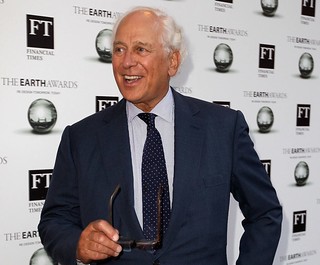 The Rothschild banking dynasty dates to back to the mid-18th century in Frankfurt, Germany, where Mayer Amschel Rothschild turned a rare coin business into a financial services firm. He sent his five sons to major cities throughout Europe to lay the framework for a multinational empire.
The Rothschild banking dynasty dates to back to the mid-18th century in Frankfurt, Germany, where Mayer Amschel Rothschild turned a rare coin business into a financial services firm. He sent his five sons to major cities throughout Europe to lay the framework for a multinational empire.
Mr. Rothschild's great-great-grandfather Nathan Mayer Rothschild arrived in England in 1798, working as a textile merchant and eventually founding a bank. The family's role in English life was immense. The Rothschilds financed the British Army in the Napoleonic Wars and later the purchase of the Suez Canal.
Strictly in terms of their combined capital, the Rothschilds were in a league of their own,
wrote historian Niall Ferguson in his book The House of Rothschild.
The twentieth century has no equivalent: not even the biggest of today's international banking corporations enjoys the relative supremacy enjoyed by the Rothschilds in their heyday.
To read the complete article, see:
Evelyn de Rothschild, banking heir and adviser to the queen, dies at 91
(https://www.washingtonpost.com/obituaries/2022/11/10/evelyn-de-rothschild-advisor-to-the-queen-dies-at-91/)

